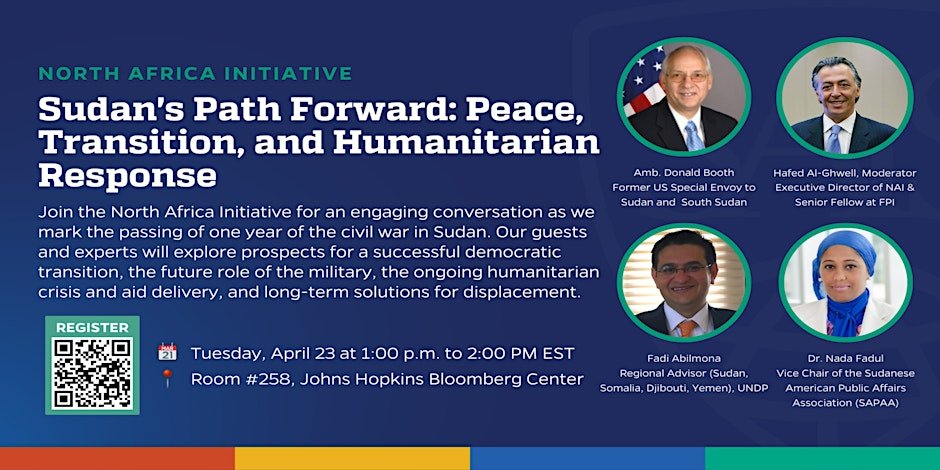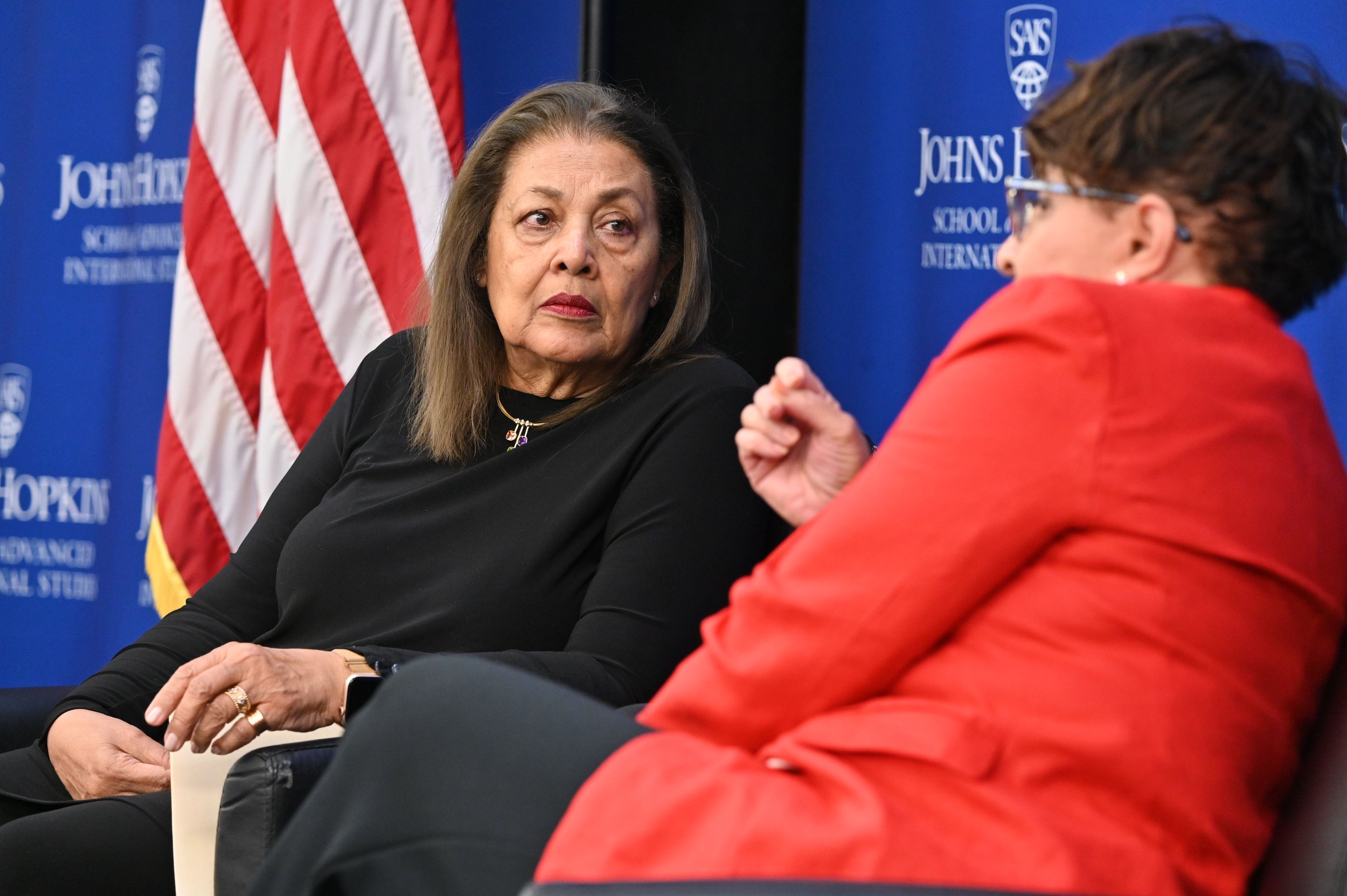
Upcoming Events

Four Years On: Taking Stock of the Renewed Russian Invasion of Ukraine
Overview
FPI Senior Fellow Daniel Serwer leads a discussion with Eugene Finkel, Sergey Radchenko, and Lauren Van Metre.
As Russia's war against Ukraine ends its fourth year and enters its fifth, FPI Senior Fellow Daniel Serwer is convening a panel discussion with experts on the region to look at Ukraine's centuries-long struggle with Russia, how the war is reshaping civil society in the country, and prospects for an end to the conflict.
(This is a hybrid event. Dr. Serwer and Dr. Van Metre will appear in person at the Hopkins Bloomberg Center in DC, while Dr. Finkel and Dr. Radchenko will appear remotely from SAIS Bologna. Please register via Eventbrite to attend the in-person event. You can also watch via our livestream on YouTube at this link, no registration required: https://youtube.com/live/3lbT8ie2M3A)
About The Speakers
Daniel Serwer is a Senior Fellow at the SAIS Foreign Policy Institute. He is the author of Strengthening International Regimes: the Case of Radiation Protection (Palgrave Macmillan, 2024) as well as From War to Peace in the Balkans, the Middle East and Ukraine (Palgrave Macmillan, 2019) and Righting the Balance (Potomac Books, November 2013). He edited (with David Smock) Facilitating Dialogue (USIP, 2012) and supervised preparation of Guiding Principles for Stabilization and Reconstruction (USIP, 2009). Guiding Principles is the leading compilation of best practices for civilians and military in post-war state-building.
As vice president of the Centers of Innovation at the United States Institute of Peace (USIP), Serwer led teams working on rule of law, peacebuilding, religion, economics, media, technology, security sector governance and gender. He was also vice president for peace and stability operations at USIP, overseeing its peacebuilding work in Afghanistan, the Balkans, Iraq, and Sudan, and serving as executive director of the Hamilton/Baker Iraq Study Group.
As a minister-counselor at the U.S. Department of State, Serwer directed the European office of intelligence and research and served as U.S. special envoy and coordinator for the Bosnian Federation, mediating between Croats and Muslims and negotiating the first agreement reached at the Dayton Peace Talks; from 1990 to 1993, he was deputy chief of mission and chargé d’affaires at the U.S. Embassy in Rome, leading a major diplomatic mission through the end of the Cold War and the first Gulf War.
Serwer is a graduate of Haverford College and earned master’s degrees at the University of Chicago and Princeton, where he also did his PhD in the history of science.
For more information about the event and speakers, follow the link here: Taking Stock of the Renewed Russian Invasion of Ukraine
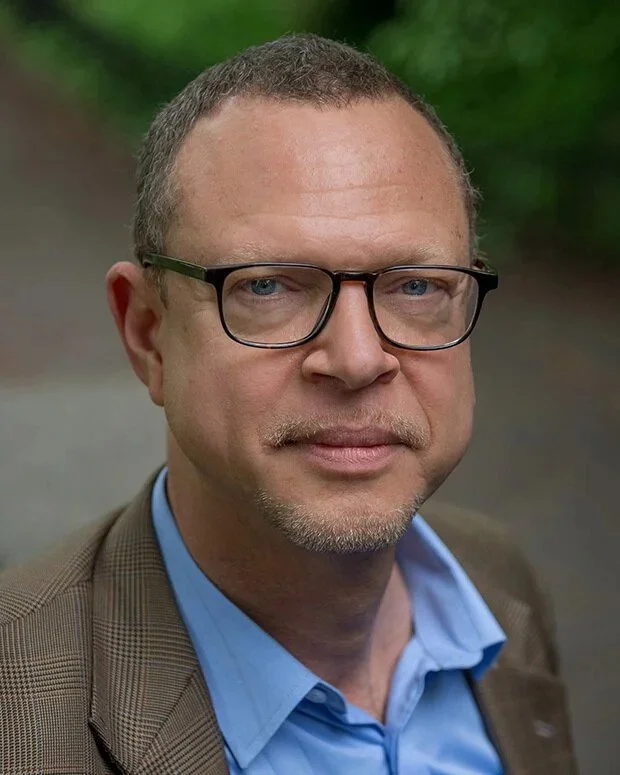
Howard French: 2026 Betty Lou Hummel Memorial Lecture
The Foreign Policy Institute is pleased to announce that Howard French—career foreign correspondent, global affairs writer, and professor at the Columbia Journalism School—will be the speaker for the 2026 Betty Lou Hummel Memorial Lecture.
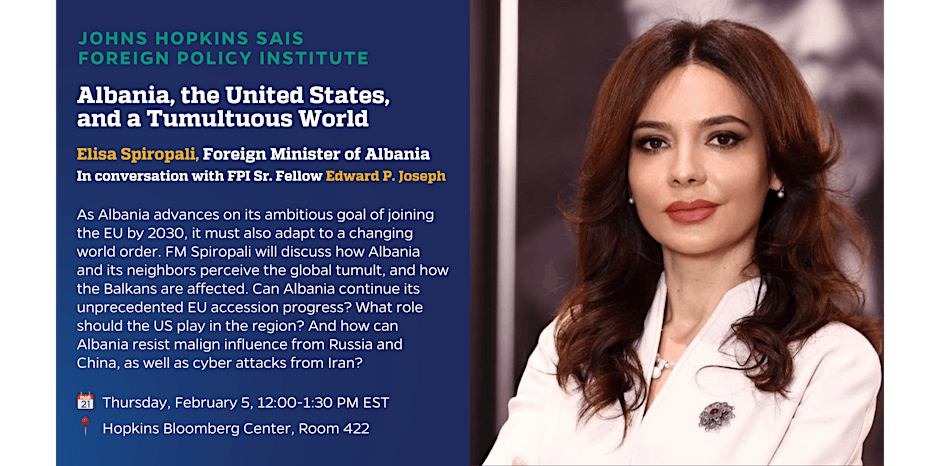
Albania, the United States, and a Tumultuous World
Overview
Elisa Spiropali, Foreign Minister of Albania, discusses how her country is adapting to a changing world order as it pursues EU membership.
As Albania advances on its ambitious goal of joining the EU by 2030, it must also adapt to a changing world order. FM Spiropali will discuss how Albania and its neighbors perceive the global tumult, and how the Balkans are affected. Can Albania continue its unprecedented EU accession progress? What role should the US play in the region? And how can Albania resist malign influence from Russia and China, as well as cyber attacks from Iran?
In conversation with FPI Senior Fellow Edward P. Joseph.
About the Speakers
Ms. Elisa Spiropali was born on 15 March 1983 in Tirana.
Since September 2025, she has held the position of the Minister for Europe and Foreign Affairs.
She has served as Speaker of the Assembly of the Republic of Albania during its 10th Legislature. In this role, she distinguished herself by revitalizing and strengthening parliamentary diplomacy, representing the Assembly in international initiatives, and fostering inter-institutional cooperation with partner parliaments.
From January 2019 to July 2024, Ms. Spiropali served as Minister of State for Relations with Parliament, a position to which she was reappointed in September 2021.
She has been elected as a Member of the Parliament of Albania for three consecutive terms since 2017, holding senior positions in party leadership and standing out as a distinguished political figure.
Before her political engagement, Ms. Spiropali was actively involved in civil society, particularly in the fields of good governance and civic participation, and also worked as a lecturer in political science and international relations.
In 1999, at the age of 16, she left Albania on a full merit-based scholarship to pursue the IB Diploma at Lester B. Pearson College, UWC, Canada. She later graduated with honors in Politics and Economics from Mount Holyoke College, USA. She then pursued postgraduate studies in Contemporary European Politics (MA) at the University of Sussex, United Kingdom, as a Chevening Scholar.
Ms. Spiropali is married and has two children, Nalta and Kren.
Edward P. Joseph, as a veteran of the Balkans conflicts, has served in every conflict theatre in the region, during the war years as well as in post-war implementation. This includes service with the UN, OSCE, US Army/NATO, International Crisis Group, and Catholic Relief Services. In a dozen years on the ground, Edward served as a senior official in all three of the region’s divided cities: Mostar, Brcko and Mitrovica.
In May 2012, as the US-nominated Deputy Head of the OSCE Mission in Kosovo, Edward negotiated the eleventh hour agreement between Belgrade and Pristina to hold Serbian national elections in Kosovo, averting a confrontation.
A key moment of his war-time service occurred in July 1995 – contemporaneous with the massacres in neighboring Srebrenica – when Edward and one UN colleague coordinated the evacuation of women, children and wounded soldiers from the fallen Žepa ‘safe area.’ This entailed face-to-face dealings with Generals Ratko Mladić and other senior Bosnian Serb officers; Edward testified in two Hague Tribunal trials that resulted in convictions. Outside the Balkans, Edward has served in missions in Iraq (2007), Afghanistan (2008-9), Pakistan (2007-8) and Haiti (2005-6; 2010.) He has led the Institute of Current World Affairs and the National Council on US-Libya Relations.
Edward earned his J.D. at the University of Virginia School of Law, and his B.A. and M.A. from Johns Hopkins University, and its School of Advanced International Studies. He teaches, convenes events, and researches at SAIS. Trained as a helicopter pilot in the US Army Reserve, Edward is a veteran. He speaks Bosnian/Croatian/Serbian; and French, Italian and Spanish.
For more details and registration for the event, follow the link: Elisa Spiropali, Foreign Minister of Albania
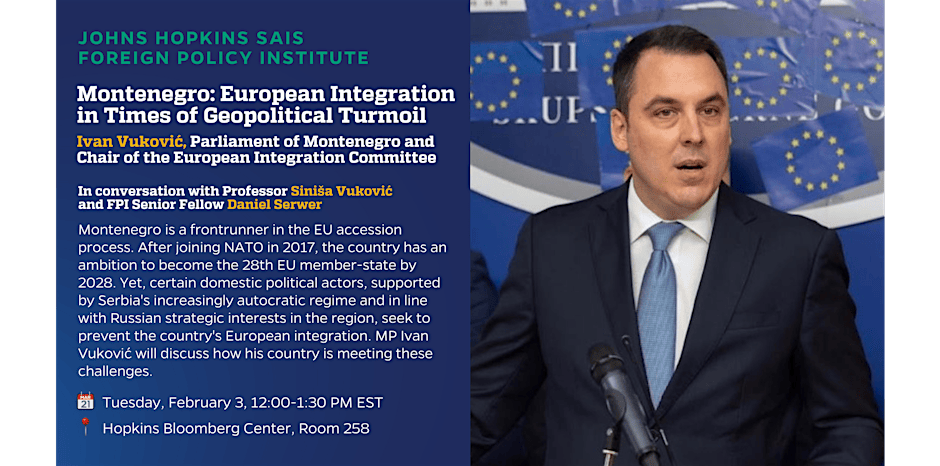
Montenegro: European Integration in Times of Geopolitical Turmoil
Overview
Ivan Vuković, MP in Montenegro and Chair of the European Integration Committee, in conversation with Siniša Vuković and Daniel Serwer.
Montenegro, a small multi-ethnic Balkan state, is a frontrunner in the EU accession process. After joining NATO in 2017, the country has an ambition to become the 28th EU member-state by 2028. Yet, certain domestic political actors, supported by Serbia's increasingly autocratic regime and in line with Russian strategic interests in the region, seek to prevent the country's European integration. This makes Montenegro an important piece of a wider geopolitical puzzle and, from a theoretical point of view, a very interesting case study.
About the Speakers
Ivan Vuković is an Associate Professor at the Faculty of Political Science, University of Montenegro. He holds an MA degree from Leiden University and PhD from Central European University. As a Fullbright scholar, he completed his postdoctoral studies at George Washington University. Currently, he is a member of the Parliament of Montenegro and Chairperson of the European Integration Committee. Previously, he served as a Mayor of Podgorica, Montenegro's capital city.
Also a scholar at the Middle East Institute, Daniel Serwer is the author of From War to Peace in the Balkans, the Middle East and Ukraine (Palgrave MacMillan, 2019) as well as Righting the Balance (Potomac Books, November 2013), editor (with David Smock) of Facilitating Dialogue (USIP, 2012) and supervised preparation of Guiding Principles for Stabilization and Reconstruction (USIP, 2009). Guiding Principles is the leading compilation of best practices for civilians and military in post-war state-building.
As vice president of the Centers of Innovation at the United States Institute of Peace (USIP), Serwer led teams working on rule of law, peacebuilding, religion, economics, media, technology, security sector governance and gender. He was also vice president for peace and stability operations at USIP, overseeing its peacebuilding work in Afghanistan, the Balkans, Iraq and Sudan and serving as executive director of the Hamilton/Baker Iraq Study Group.
As a minister-counselor at the U.S. Department of State, Serwer directed the European office of intelligence and research and served as U.S. special envoy and coordinator for the Bosnian Federation, mediating between Croats and Muslims and negotiating the first agreement reached at the Dayton Peace Talks; from 1990 to 1993, he was deputy chief of mission and chargé d’affaires at the U.S. Embassy in Rome, leading a major diplomatic mission through the end of the Cold War and the first Gulf War.
Serwer is a graduate of Haverford College and earned masters degrees at the University of Chicago and Princeton, where he also did his PhD in history of science.
Dr. Siniša Vuković is Senior Lecturer of Conflict Management and Global Policy, and the Director of the Master of Arts in Global Policy Program (MAGP).
Previously, he was the Associate Director of the Conflict Management Program (2018-2021). His research focuses on various forms of international conflict resolution, negotiation and mediation. He has published in a range of scholarly journals such as Journal of Peace Research, Cooperation and Conflict, Global Policy, The Washington Quarterly, Studies in Conflict and Terrorism, Swiss Political Science Review, Millennium Journal of International Studies, International Journal of Conflict Management, International Negotiation, Asia and the Pacific Policy Studies, and Ethnopolitics; policy-relevant outlets such as Foreign Affairs, Foreign Policy, European Council on Foreign Relations, World Economic Forum, Sustainable Security, and Policy Forum; and contributed to several edited volumes with book chapters.
His is the author of International Multiparty Mediation and Conflict Management(Routledge, 2017), and Rethinking Conflict Management and Resolution (with I. William Zartman; Edward Elgar, 2023), and the co-editor of Revisiting the Ripeness Debate (with Tetsuro Iji; Routledge, 2022). His current book projects include: The International Negotiation Process (with P. Terrence Hopmann), and The Research Handbook on the Politics of International Agreements (with P. Terrence Hopmann, Edward Elgar, 2024).
He has taught a variety of undergraduate and graduate courses related to the field of conflict management, with a particular focus on the process of negotiation and mediation. He is also a visiting professor at the Institute of Security and Global Affairs, Leiden University, and at the Amsterdam University College, University of Amsterdam. He received his PhD in International Relations and Conflict Resolution at Leiden University, an MA in International Relations and Diplomacy from Leiden University and The Netherlands Institute of International Relations “Clingendael”, and a BA (laurea) in Political Science from University of Rome “La Sapienza”. He is the recipient of many research grants, including “Rubicon” from the Netherlands Organization for Scientific Research (NWO), and Gerda Henkel Foundation research grant.
For more event details & registration follow the link: Ivan Vuković, MP for Montenegro

Securing Space: A Plan for US Action
A CFR Task Force examines challenges to US security in outer space and reflects on the future of US leadership in this critical domain.
Outer space is vitally important to the United States. Yet as space becomes increasingly congested and contested, especially in low Earth orbit, the United States risks losing its leadership role in a critical strategic domain. The Council on Foreign Relations (CFR) convened a bipartisan Task Force, cochaired by Lieutenant General Nina Armango and Congresswoman Jane Harman and directed by Dr. Esther Brimmer, to assess these challenges. The Task Force report, Securing Space: A Plan for US Action, urges the United States to address threats to space assets, champion space traffic management to support the growing space economy, and incorporate commercial perspectives into civilian and national security space policy. The Task Force leaders will share the report’s findings and recommendations and reflect on the future of US leadership in outer space.
Please register at the link below:

China and the Global Economic Order
Join us on Thursday, October 16, for a special book launch event with FPI Senior Fellow Gregory T. Chin, celebrating the release of his new book, China and the Global Economic Order, published by Cambridge University Press. In this timely and incisive work, Chin explores China’s evolving role within the global economic system and the broader implications for international governance, trade, and finance.
The event will feature a discussion with the author on how China’s integration into—and, at times, contestation of—the global economic order has reshaped global institutions and policy debates. Attendees will gain fresh insights into China’s economic diplomacy, its shifting position in multilateral organizations, and what these changes mean for the future of global economic cooperation.
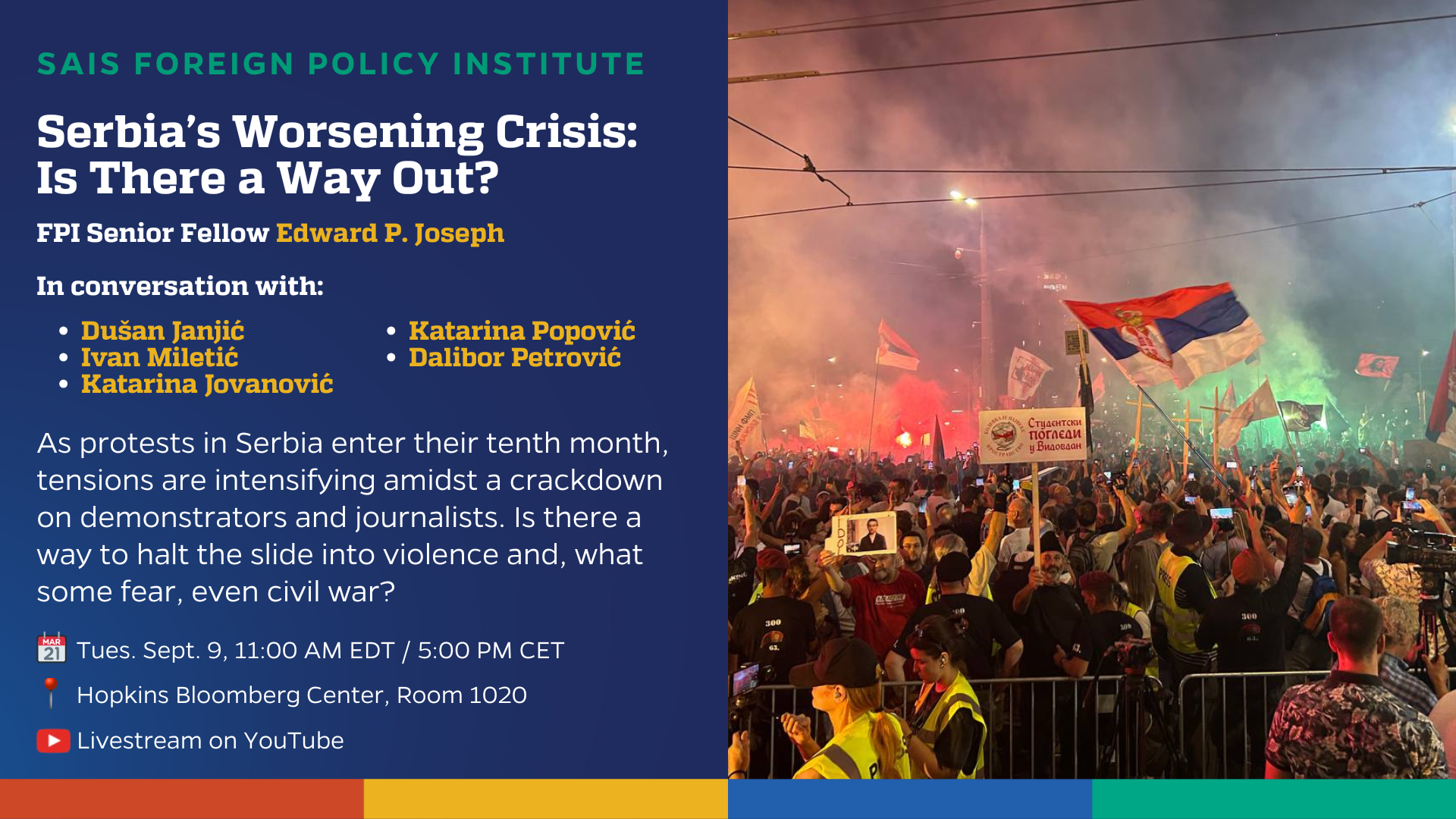
Serbia's Worsening Crisis: Is There A Way Out?
A conversation with leading Serbian activists and academics, hosted by FPI Senior Fellow Edward P. Joseph.

The Joint Security Declaration of Albania, Croatia, and Kosovo
Meeting in Tirana last month, the Defense Ministers of Albania, Croatia, and Kosovo surprised many observers – and dismayed others -- by signing a Joint Declaration in the security realm. Citing NATO’s Strategic Concept and the EU’s Strategic Compass, the far-reaching declaration promises cooperation on critical goals and challenges of the era:
Promoting defense industry and supply chains
Enhancing interoperability
Countering hybrid threats
Advancing Euro-Atlantic integration
Is the Joint Declaration a model of regional and European self-reliance, and a watershed for Balkans security? What about sharp negative reaction in some quarters?
Join us for this exceptional discussion featuring Albanian Ambassador Ervin Bushati, Croatian Ambassador Pjer Šimunović and Kosovo Ambassador Ilir Dugolli, hosted by SAIS Lecturer & FPI Senior Fellow, Edward P. Joseph.
About the speakers
Ervin Bushati currently serves as the resident Ambassador of Albania to the United States and as the non-resident Ambassador to Mexico, Panama, the Dominican Republic, Guatemala, and Costa Rica. He has previously sat as a Member of Parliament in Albania from 2013 to 2021, where he also worked on the Economy and Finance Committee, the Foreign Policy Committee, and as the Head of the Delegation to the Parliamentary Assembly of the European Council. Mr. Bushati also covered elections in Russia and Ukraine as an election reporter for the OSCE and the Council of Europe, delivering strong content regarding the process of election, while staying politically neutral and providing a fair reflection of views in those countries.
Before starting in politics, Mr. Bushati was the founder and managing director of Bushati Konstruksion. He earned his bachelor's degree in economics from DePaul University in Chicago in 1999.
Pjer Šimunović has served as Croatia's Ambassador to the US since September 2017. Together with a career in journalism and academic research he served in various high-level positions in the Croatian Government, in the fields of national security, defense and diplomacy, as Director of the Office of the National Security Council, Ambassador to Israel, Defense State Secretary, National Coordinator for NATO and Assistant Foreign Minister. He worked with the BBC World Service in London, with the magazine Europ in Paris, and with the Croatian daily Večernji List; in Zagreb, covering foreign affairs. A regular speaker on political and security issues at many conferences and seminars, he is the author of a range of security studies and articles published in the leading international journals.
Ambassador Šimunović holds an M.A. degree from the Department of War Studies, King's College London. He is decorated with the title of Chevalier de la Légion d’honneur de la République française.
Ilir Dugolli currently serves as the Ambassador of the Republic of Kosovo to the United States of America.
Following Kosovo’s independence, he was among the first group of diplomats tasked with establishing Kosovo’s diplomatic missions.
He previously served as Ambassador to Turkey, with concurrent accreditations to Pakistan, Afghanistan, and Jordan. Additionally, he held the position of Ambassador to Sweden, with accreditations to Norway, Finland, Iceland, Estonia, Lithuania, and Latvia. He also served as Ambassador in Brussels, where he managed relations with Belgium, Luxembourg, NATO, and the EU.
Before joining the diplomatic service, he was affiliated with the University of Prishtina Faculty of Law and was actively involved in various civil society initiatives. Between 2002 and 2004, he served as Chief of Staff to the Prime Minister of Kosovo. He also acted as an adviser in numerous capacities, including as part of the legal team during the negotiations that led to Kosovo’s Declaration of Independence
About the Moderator
Edward P. Joseph is a Senior Fellow at the Foreign Policy Institute and Adjunct Lecturer at SAIS, specializing in Conflict Management. Edward served on the ground in the Balkans for a dozen years, including during the conflicts in each war-affected country: Bosnia-Herzegovina, Croatia, Kosovo, and then-Macedonia.
In 2012, as the US-nominated Deputy Head of the OSCE Mission in Kosovo, Edward negotiated the breakthrough agreement with Pristina and Belgrade to hold Serbian elections in independent Kosovo.
In July 1995, Edward and one UN colleague coordinated the evacuation of Zepa, close to neighboring Srebrenica.
In 1995-1996, Edward deployed with the NATO Implementation Force in Bosnia-Herzegovina as a US Army officer. He is a veteran and former Army helicopter pilot.
Edward has authored dozens of articles and reports on the region, including in SAIS Review. His June 2023 Foreign Policy article, ‘The United States is Creating a Kosovo Crisis’ described the overlooked obstacle to establishing autonomy for Kosovo Serbs. Edward was the lead author on the January 2022 SAIS-Wilson Center report explaining how the European non-recognizers (of Kosovo) stymie the entire region, and setting out a corrective strategy.
Edward has led and currently serves on the Board of the National Council on US-Libya Relations. Edward earned his J.D. at the University of Virginia School of Law, and his B.A. and M.A. from Johns Hopkins University, and its School of Advanced International Studies.
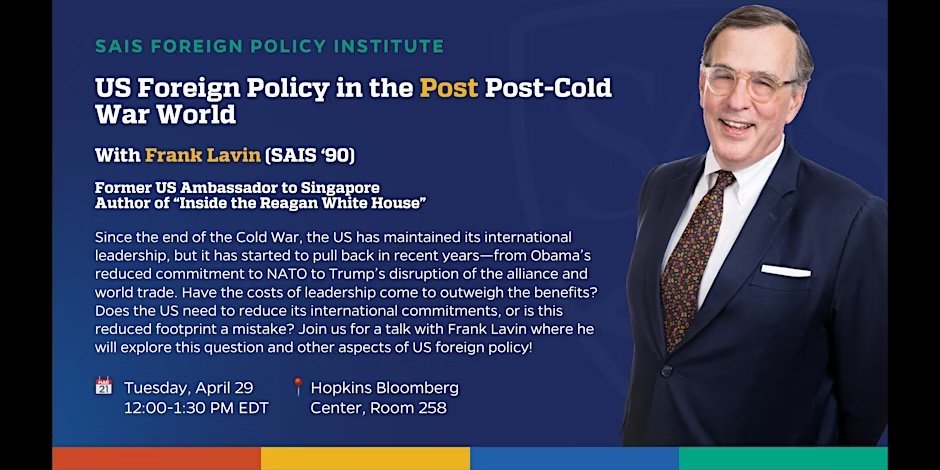
US Foreign Policy in the Post Post-Cold War World
Foreign policy during the Cold War served as a model for the US for decades after the collapse of the Soviet Union, but recent years have shown increased dissatisfaction with US international leadership and alliance management—whether you look at Obama's reduction in US commitment to NATO, Biden's withdrawal from Afghanistan, or Trump's sharp breaks with NATO and challenges to international trade. Is international leadership no longer central to US security and prosperity? Or do the costs of leadership simply exceed the benefits? Does the US need to reduce its international role and commitments, or is this reduced international footprint a mistake?
Join us for a talk with Frank Lavin (SAIS '90), where he will explore this question and other aspects of US foreign policy!
About the Speaker
Lavin served in the Reagan White House and National Security Council, the Bush 41 Commerce Department, and in the Bush 43 Administration, he served as US Ambassador to Singapore and Undersecretary for International Trade at the US Department of Commerce. In addition to his SAIS degree, he holds degrees from Georgetown (BScFS and MA Chinese) and Penn (MBA Finance). He discusses Cold War foreign policy in his latest book, Inside the Reagan White House.
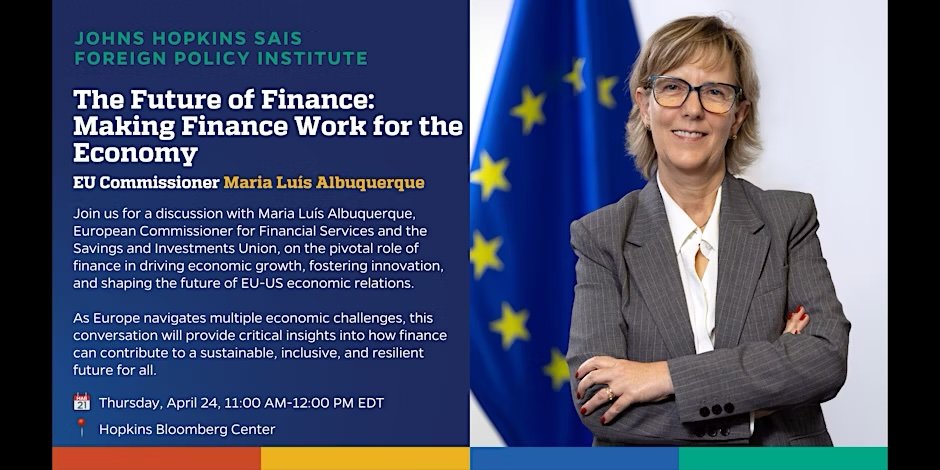
EU Commissioner Albuquerque: The Future of Finance
Join us for a discussion with Maria Luís Albuquerque, European Commissioner for Financial Services and the Savings and Investments Union, on the pivotal role of finance in driving economic growth, fostering innovation, and shaping the future of EU-US economic relations.
As Europe navigates multiple economic challenges, this conversation will provide critical insights into how finance can contribute to a sustainable, inclusive, and resilient future for all.
The discussion will be moderated by FPI Senior Fellow and former IMF First Deputy Managing Director John Lipsky.
Light refreshments will be provided.
RSVP to attend here, Room B222.
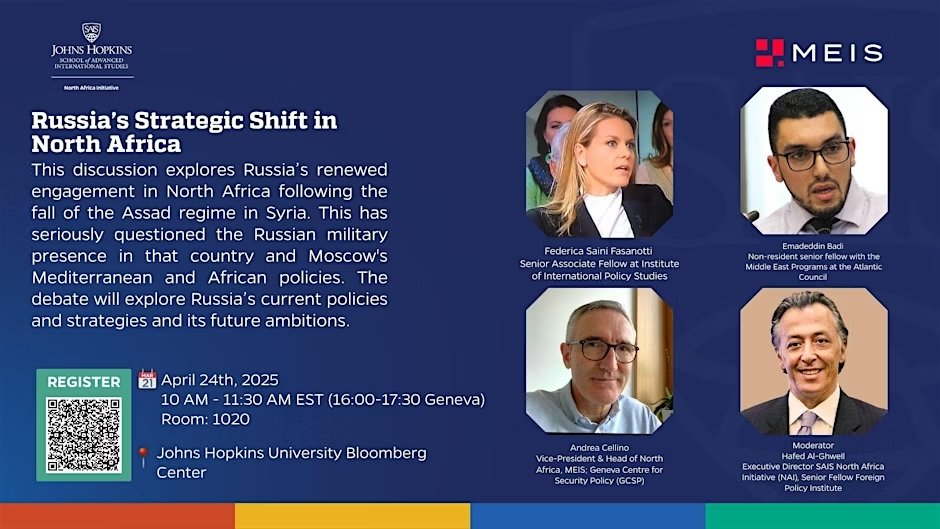
Russia’s Strategic Shift in North Africa
Join the North Africa Initiative (NAI) at Johns Hopkins SAIS and the Middle East Institute Switzerland (MEIS) for a timely discussion on Russia’s growing influence in North Africa and its implications for regional security, migration, and global geopolitics.
Attend In-Person, please RSVP here. Breakfast will be provided.
Livestream (registration is not required for online viewers): YouTube (https://www.youtube.com/@thenorthafricainitiative660/streams)
Russia’s strategic pivot to North Africa—following setbacks in Syria—has reshaped regional dynamics, from military deployments and disinformation campaigns to its exploitation of migration routes and illicit networks. This event unpacks Moscow’s ambitions, its hybrid tactics, and the urgent challenges for Western and regional stakeholders.
The session will explore:
Military Power Projection: Russia’s redeployment of private military contractors (e.g. Wagner Group, Africa Corps) in Libya and the Sahel. Implications for regional stability and counterterrorism efforts.
Soft Power & Disinformation: How Russia fuels anti-Western narratives through media, cultural diplomacy and cyber operations.
Migration, Trafficking and Transnational Crime: The role of Russian-backed forces in manipulating migration flows, arms smuggling and illicit financial networks.
Western and Regional Responses: Assessing NATO, EU and African strategies to counter Moscow’s influence.
Featured Speakers
Federica Saini Fasanotti, Senior Associate Fellow, Institute of International Policy Studies (ISPI)
Emadeddin Badi, Non-Resident Senior Fellow, Middle East Programs at the Atlantic Council
Moderator
Hafed Al-Ghwell, Executive Director, North Africa Initiative; Senior Fellow, Foreign Policy Institute, School of Advanced International Studies (SAIS) at Johns Hopkins University
Discussant
Andrea Cellino, Vice-President and Head of North Africa, Middle East Institute Switzerland (MEIS)
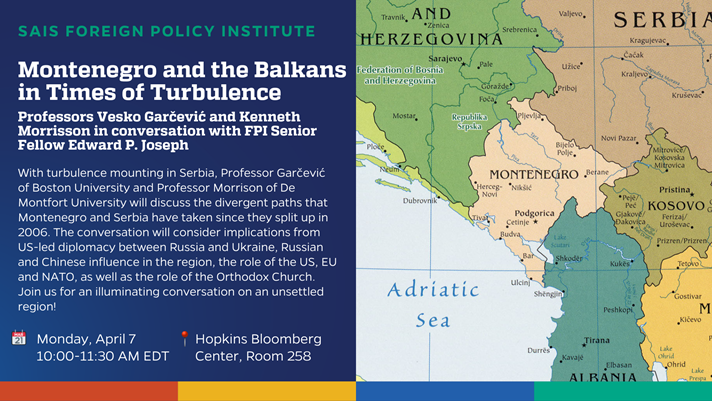
Montenegro and the Balkans in Times of Turbulence
Senior Fellow Edward P. Joseph hosts Professors Vesko Garčević and Kenneth Morrison, authors of Montenegro and Serbia: A Velvet Divorce?
With turbulence mounting in Serbia, Professor Garčević of Boston University and Professor Morrison of De Montfort University will discuss the divergent paths that Montenegro and Serbia have taken since they split up in 2006. The conversation will consider implications from US-led diplomacy between Russia and Ukraine, Russian and Chinese influence in the region, the role of the US, EU and NATO, as well as the role of the Orthodox Church.
Please RSVP on Eventbrite to attend in person: Click this link to register.
Or you watch our livestream on YouTube, no registration required: https://youtube.com/live/vyhTwPny_UA
About the Speakers
Professor Vesko Garčević, Director of the Center for the Study of Europe at Boston University, served as the Ambassador of Montenegro in Brussels (NATO) and Vienna (Organization for Security and Cooperation in Europe – OSCE and other International Organizations). He was a Montenegrin Ambassador to Austria, Belgium, Luxembourg and the Netherlands. During his diplomatic career he held important positions at the challenging political time of the dissolution of the Socialist Federal Republic of Yugoslavia and democratic transition of Montenegro. After Montenegro regained independence in 2006, he served as the first Montenegrin Ambassador to Austria and the OSCE. He has outstanding knowledge of multilateral issues, especially in the field of European Security.
Professor Kenneth Morrison is Professor of History (Chair in Modern Southeast European History), Research and Innovation Director (Global Challenges and Cultures) and UN Sustainable Development Goal (SDG) Fellow at De Montfort University, Leicester. He was a Research Associate and Visiting Professor at the European Institute at the London School of Economics and Political Science (LSE). An established specialist on the Western Balkans, he is the author of several books focusing on the modern history of the region, including Nationalism, Identity and Statehood in Post-Yugoslav Montenegro (2018), Sarajevo’s Holiday Inn: On the Frontline of Politics and War (2016) and Montenegro: A Modern History (2009). He is the co-author of Reporting the Siege of Sarajevo (2021) and The Sandžak: A History (2013). Kenneth has also written extensively for media internationally and in the Western Balkans, and for numerous think-tanks in the region. His latest book, a study of Montenegrin-Serbian relations since 1992 (co-authored with Professor Garčević) was released in January 2025.
About the Moderator
Edward P. Joseph is a Senior Fellow at the Foreign Policy Institute and Adjunct Lecturer at SAIS, specializing in Conflict Management. Edward served on the ground in the Balkans for a dozen years, including during the conflicts in each war-affected country: Bosnia-Herzegovina, Croatia, Kosovo, and then-Macedonia.
In 2012, as the US-nominated Deputy Head of the OSCE Mission in Kosovo, Edward negotiated the breakthrough agreement with Pristina and Belgrade to hold Serbian elections in independent Kosovo.
In July 1995, Edward and one UN colleague coordinated the evacuation of Zepa, close to neighboring Srebrenica.
In 1995-1996, Edward deployed with the NATO Implementation Force in Bosnia-Herzegovina as a US Army officer. He is a veteran and former Army helicopter pilot.
Edward has authored dozens of articles and reports on the region, including in SAIS Review. His June 2023 Foreign Policy article, ‘The United States is Creating a Kosovo Crisis’ described the overlooked obstacle to establishing autonomy for Kosovo Serbs. Edward was the lead author on the January 2022 SAIS-Wilson Center report explaining how the European non-recognizers (of Kosovo) stymie the entire region, and setting out a corrective strategy.
Edward has led and currently serves on the Board of the National Council on US-Libya Relations. Edward earned his J.D. at the University of Virginia School of Law, and his B.A. and M.A. from Johns Hopkins University, and its School of Advanced International Studies.
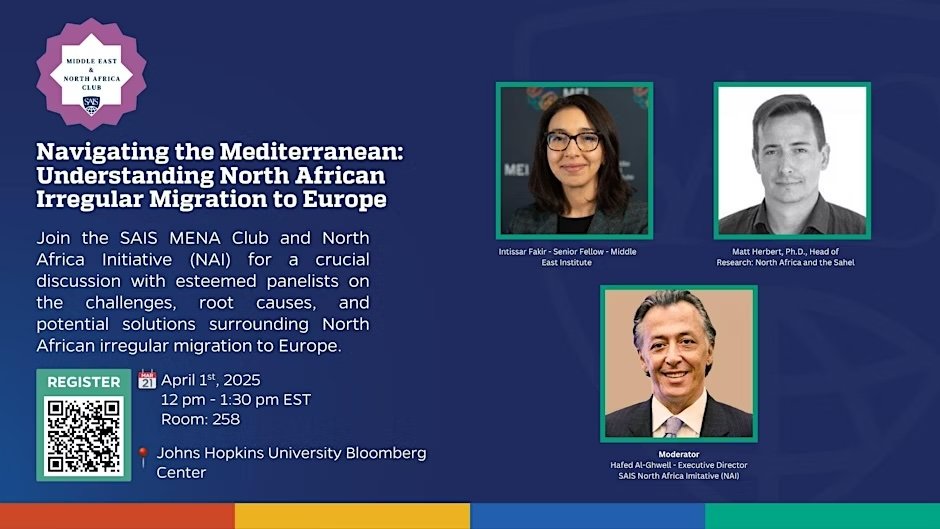
Navigating Mediterranean: Understanding NA Irregular Migration to Europe
Organized by the SAIS Middle East & North Africa Club, in collaboration with the North Africa Initiative (NAI) at the Foreign Policy Institute of the Johns Hopkins University SAIS.
Join us at the Johns Hopkins University Bloomberg Center for a focused expert discussion on irregular migration from North Africa to Europe. This event will examine the key drivers behind migration across the Mediterranean—ranging from socioeconomic and political instability to environmental stressors and transnational crime—while exploring the human stories behind the statistics. The program will include a short documentary, and lunch will be provided.
Speakers will assess current legal frameworks, the role of sanctions and state fragility, and offer concrete policy recommendations to address the challenges and opportunities of irregular migration in the region.
Register on Eventbrite.
Speakers:
Dr. Matt Herbert, Head of Research, North Africa & the Sahel — Global Initiative Against Transnational Organized Crime
Intissar Fakir, Senior Fellow & Director, North Africa & Sahel Program — Middle East Institute
Hafed Al-Ghwell (moderator), Executive Director, North Africa Initiative & Senior Fellow, Foreign Policy Institute, Johns Hopkins SAIS
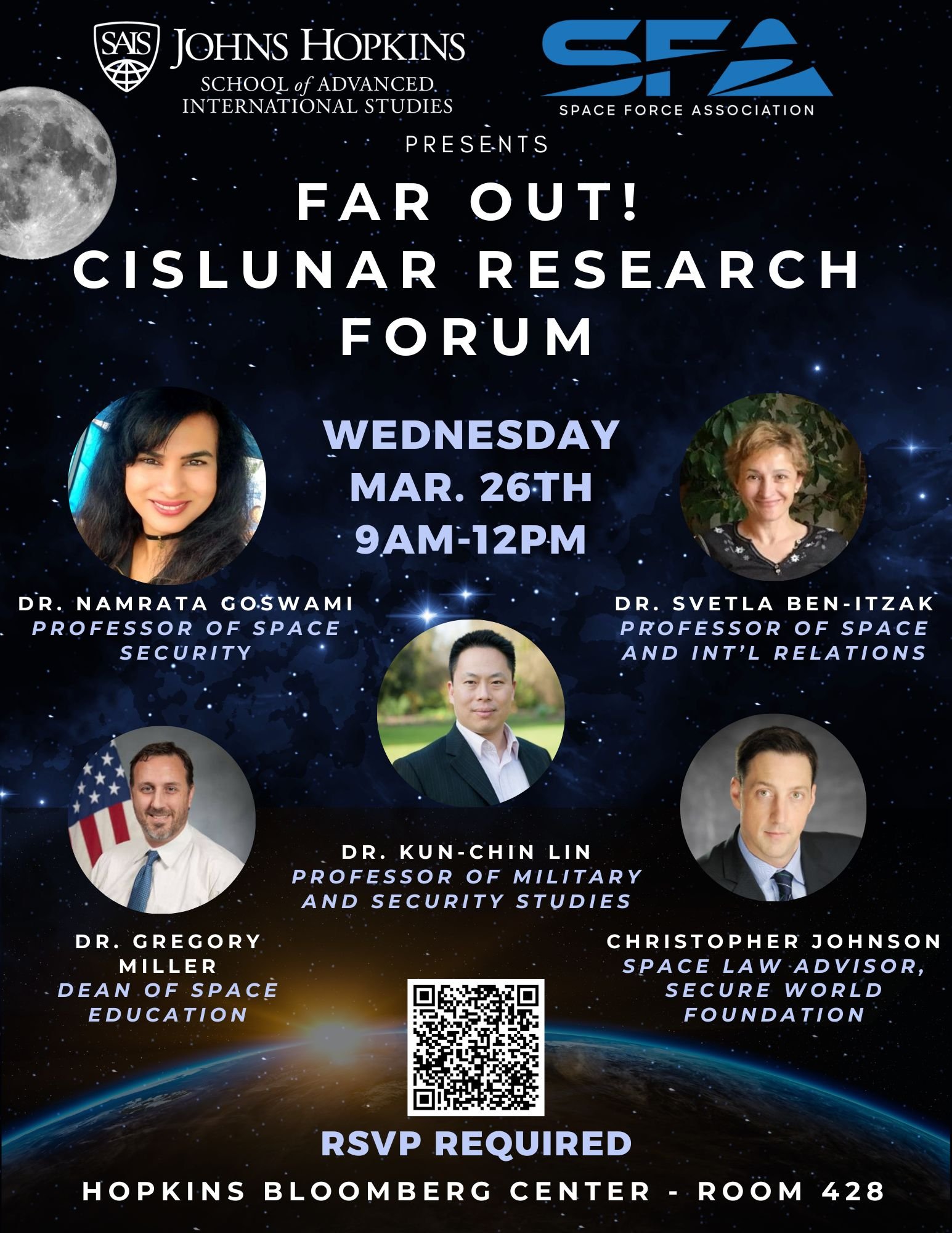
Far Out! Cislunar Research Forum
Please join the US Space Force Delta 13 and Foreign Policy Institute for our "Far Out! Cislunar Research Forum" on Wednesday, March 26th from 9am-12pm
The Cislunar region between the Earth and the Moon is increasingly prioritized by space powers as crucial to achieving their longer-term development priorities across the military-civilian, public-private, and geographical regional divides. This forum focuses on cislunar competition and cooperation among space powers and emerging governance frameworks. The four panelists – leading thinkers in cislunar research from the US Space Force and SAIS-Johns Hopkins and the Secure World Foundation – will present research including:
Applying international regimes to address cislunar conflicts of interest;
Explaining through network analysis the emerging alignment of space powers with either Chinese-led or American-led scientific and normative projects.
Exploring the interactive dynamics of China, India, Japan, South Korea, and Middle Eastern and South Asian space powers as they strive to define their cislunar policies and adopt best practices.
Predicting how cislunar capabilities could bridge the terrestrial-based security and developmental uses of outer space through ambitious resource exploration and colonization plans for the Moon and Mars and beyond.
Panelists include:
Dr. Gregory Miller (US Space Force, SAIS-Johns Hopkins)
Dr. Svetla Ben-Itzak (US Space Force, SAIS-Johns Hopkins)
Dr. Namrata Goswami (US Space Force, SAIS-Johns Hopkins)
Mr. Christopher Johnson (Secure World Foundation)
Moderated by Professor Kun-Chin Lin (US Space Force, SAIS-Johns Hopkins)
The Cislunar Research Forum is open to the public. If you’d like to join us, please register with the link below:
https://www.eventbrite.com/e/far-out-cislunar-research-forum-tickets-1291781285599?aff=oddtdtcreator
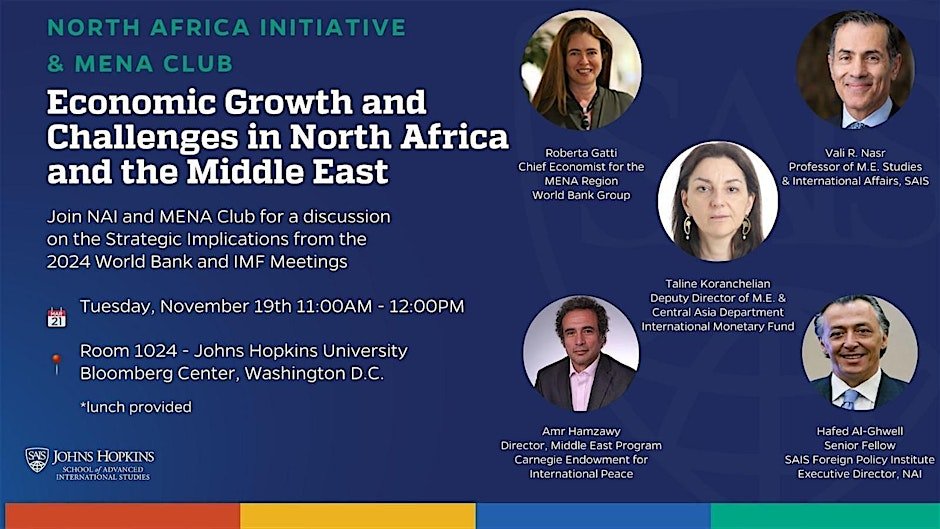
Economic Growth & Challenges in North Africa and the Middle East: Strategic Implications from the 2024 World Bank and IMF Meetings
The North Africa Initiative (NAI) of the SAIS Foreign Policy Institute, in collaboration with the SAIS MENA Club, is pleased to invite you to an expert-led discussion on the outcomes of the recent World Bank and IMF Annual Meetings, with a particular focus on the implications for North Africa and the broader Middle East. This event will provide a rigorous analysis of the current economic landscape and forward-looking perspectives on the roles of the World Bank and IMF in navigating persistent challenges within the region, including insecurity and economic instability.
To attend in-person, please RSVP on Eventbrite.
Or, you can watch the livestream on YouTube. No registration required.
Discussion topics will include:
World Bank Group/IMF Economic Outlook for MENA: An overview of the recently published economic forecast for the Middle East and North Africa following the 2024 Annual Meetings, with particular attention to key findings and anticipated trends.
Political Economy and Regional Dynamics: A thorough examination of the political economy of the MENA region, assessing the impact of this year’s World Bank and IMF findings amidst ongoing regional conflicts and structural challenges.
Egypt as a Case Study: A focused analysis of Egypt’s economic conditions, highlighting how recent policies and decisions from the World Bank and IMF are influencing both the broader region and North Africa in particular.
Welcome Remarks
Professor Vali Nasr, Majid Khadduri Professor of Middle East Studies and International Affairs, Johns Hopkins University School of Advanced International Studies (SAIS)
Speakers
Dr. Roberta Gatti, Chief Economist of the Middle East and North Africa (MENA) region, World Bank Group
Ms. Taline Koranchelian, Deputy Director in the Middle East and Central Asia Department, the International Monetary Fund (IMF)
Dr. Amr Hamzawy, Director of the Middle East Program, Carnegie Endowment for International Peace
Hafed Al-Ghwell (moderator), Executive Director of the North Africa Initiative and Senior Fellow at the Foreign Policy Institute of the Johns Hopkins University School of Advanced International Studies
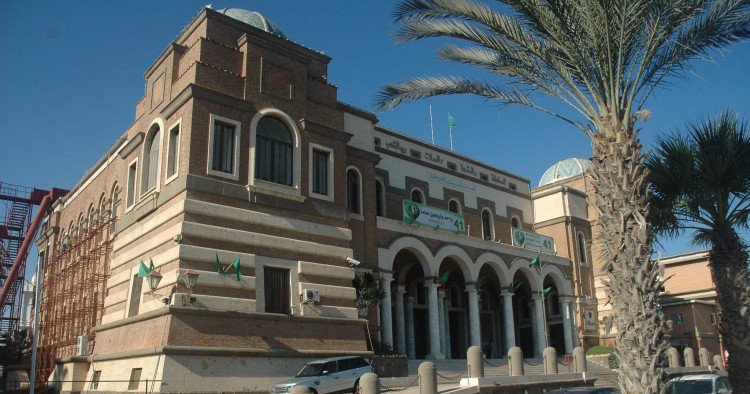
An End to the CBL Crisis? Implications for Libya’s Economic Governance
The North Africa Initiative (NAI) at the Foreign Policy Institute (FPI) of the Johns Hopkins Paul H. Nitze School of Advanced International Studies invites you to a webinar organized in partnership with Chatham House.
In August this year, the Libyan Presidency Council moved to replace Libya’s longtime central bank governor, Sadiq al-Kabir. Kabir had been in position since September 2011, and in the period following the administrative division of Libya, he rose to prominence as one of the most influential figures on the Libyan political scene. In the absence of a functioning relationship between executive and legislature, the Central Bank of Libya (CBL) took on many of the competencies of the ministry of finance and became an arbiter of which payments were made and when. In October, following UN-led and parallel back-channel negotiations, a new governor was selected and the CBL board of directors reconstituted.
In this webinar, experts will examine:
What challenges will the new CBL leadership face?
Can we expect significant changes for Libya’s economic governance?
What are the implications for the balance of power between Libya’s rival power centers?
Register for the online event here.
Alternatively, watch the livestream on Facebook.
Speakers
Hafed Al-Ghwell, Senior Fellow and Executive Director, North Africa Initiative at the SAIS Foreign Policy Institute
Stephanie Williams, Former Special Advisor to the UN Secretary General on Libya
Tim Eaton, Senior Research Fellow, Middle East and North Africa Programme,Chatham House
Asma Khalifa (Moderator), Associate Fellow, Middle East and North Africa Programme, Chatham House
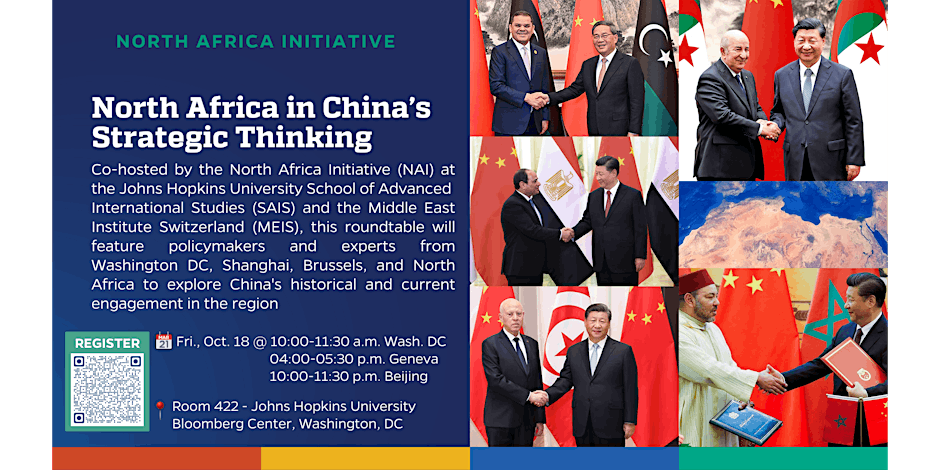
North Africa in China’s Strategic Thinking
Hosted by the North Africa Initiative of SAIS Foreign Policy Institute and the Middle East Institute Switzerland (MEIS)
Join us for an insightful hybrid panel discussion explores China’s historical engagement in North Africa, its current policies and strategies, and its future ambitions. This session features policymakers and experts from Washington D.C., Shanghai, Brussels and North Africa, and further addresses the implications of China’s North African engagement for US and EU foreign policy and strategic thinking.
Register via Eventbrite to attend in person,
Or watch our livestream on YouTube, no registration required.
About the Speakers
Adam K Webb, Co-Director of the Hopkins-Nanjing Center, HNC Resident Professor of Political Science Johns Hopkins University School of Advanced International Studies
Chuchu Zhang, Associate Professor of International Relations, Fudan University
Jonathan Fulton, Nonresident Senior Fellow for Atlantic Council’s Middle East Programs and the Scowcroft Middle East Security Initiative
Yahia H. Zoubir, Nonresident Senior Fellow, Middle East Council on Global Affairs, Doha
Andrea Ghiselli, Assistant Professor at the School of International Relations and Public Affairs (SIRPA) of Fudan University and non-resident Research Fellow with the TOChina Hub and the Head of Research for the TOChina Hub’s ChinaMed Project
Victor J. Willi (Discussant), Co-Founder and Vice President Research of the Middle East Institute Switzerland (MEIS)
Moderator
Hafed Al-Ghwell, Senior Fellow at SAIS Foreign Policy Institute and Executive Director of the North Africa Inititiave
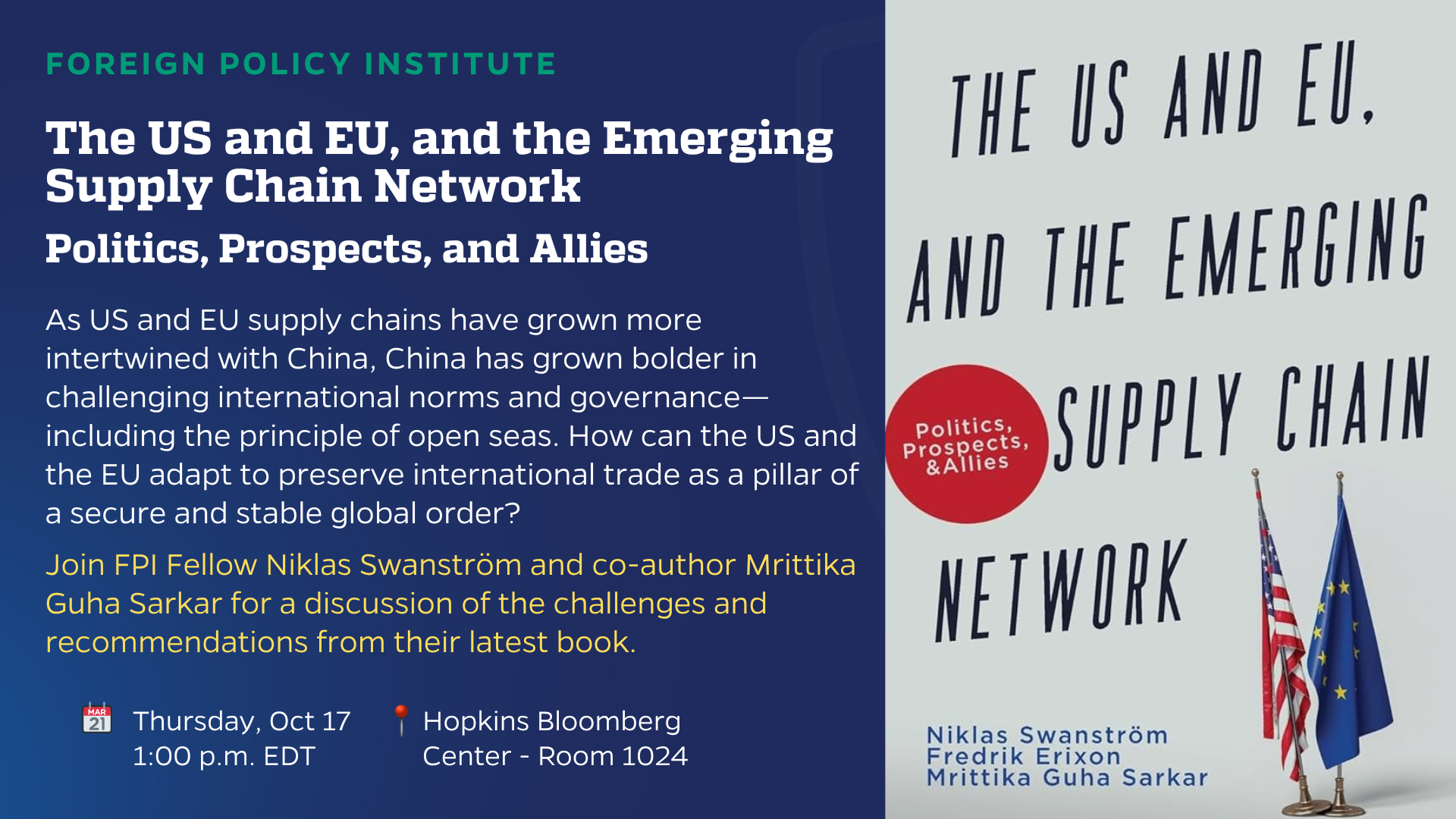
The US and EU, and the Emerging Supply Chain Network
As US and EU supply chains have grown more intertwined with China, China has grown bolder in challenging international norms and governance—including the principle of open seas. How can the US and the EU adapt to preserve international trade as a pillar of a secure and stable global order?
Join FPI Fellow Niklas Swanström and co-author Mrittika Guha Sarkar for a discussion of the challenges and recommendations from their latest book.
Register on Eventbrite to attend in person.
About the Speakers
Dr. Niklas Swanström is a fellow at the Foreign Policy Institute of the Johns Hopkins University School of Advanced International Studies (SAIS). He is Director and Co-Founder of the Institute for Security and Development Policy. In addition, he is non-resident Professor at Sichuan University and a guest professor at LeShan Normal University in China. His main areas of expertise are conflict prevention, conflict management and regional cooperation, Chinese foreign policy and security in Northeast Asia, the Belt and Road Initiative, traditional and non-traditional security threats and effects on regional and national security as well as negotiations. He focused on Northeast Asia, Central Asia, and Southeast Asia.
Swanström has authored, co-authored or edited a number of books, including Eurasia’s Ascent in Energy and Geopolitics, Sino-Japanese Relations: The Need for Conflict Prevention and Management, Transnationell brottslighet: ett säkerhetshot? (Trans-national Crime: A Security Threat?), Regional Cooperation and Conflict Management: Lessons from the Pacific Rim, and Foreign Devils, Dictatorship or Institutional Control: China's foreign policy towards Southeast Asia.
He holds a Ph.D. in Peace and Conflict Studies from Uppsala University in Sweden. His dissertation dealt with regional cooperation and conflict management in the Pacific Rim. He also holds a Licentiate degree from the Department of Peace and Conflict research, where he examined Chinese foreign policy towards Southeast Asia. He holds M.A. degrees from Uppsala University and the Fletcher School of Law and Diplomacy at Tufts University. He has also been a student at Beijing Languages Institute, Beijing University, and Dalian Languages University.
Mrittika Guha Sarkar is SIS Dean’s Awardee and Graduate Assistant at the School of International Studies (SIS), The American University, Washington DC, USA. She is further Research Fellow working with the Changing Aid Signature Research Initiative (SRI), at the American University. She has previously been associated with the Chinese Language Center, National Chengchi University (NCCU), Taipei, Taiwan, as a Language Scholar, and the Centre for East Asian Studies, School of International Studies, Jawaharlal Nehru University (JNU), New Delhi as a Research Scholar in Chinese studies. In addition, she has worked at the Centre for Strategic Studies and Simulation, The United Service Institution of India as a Research Associate, and the East Asia Centre at the Manohar Parrikar Institute for Defence Studies and Analyses (MP-IDSA) as a Project Assistant. Her area of focus mainly encompasses China’s foreign policy and strategic affairs. She has also researched on India-China relations, as well as the geostrategic affairs of the Indo-Pacific region, and East Asia’s geopolitics and security affairs, focusing on the regional developments of Japan and the Korean Peninsula.
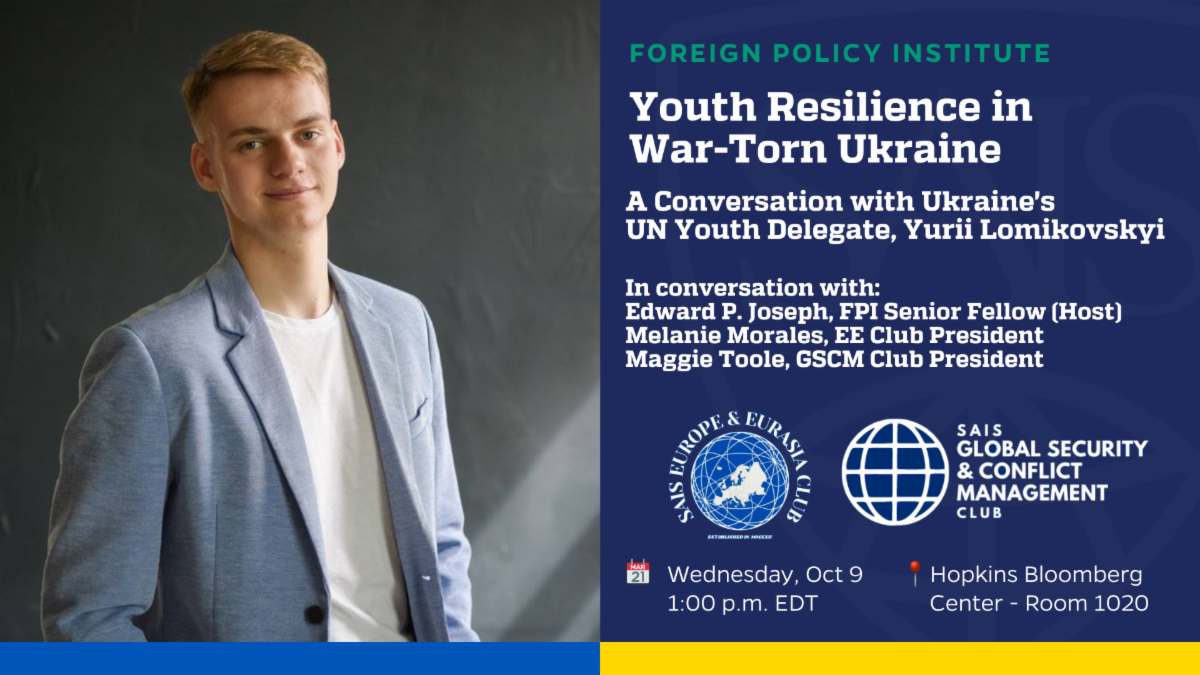
Youth Resilience in War-Torn Ukraine
Hosted by the SAIS Foreign Policy Institute in partnership with the Global Security and Conflict Management Club and the Europe-Eurasia Club.
Join us on 9 October at 1 p.m. as Yurii Lomikovskyi, Ukraine's UN Youth Delegate, explains how his generation is coping with nearly three years of full-scale invasion/war, with no end in sight. Yurii will describe 'the new normal' for young people in Ukraine, and address wider questions related to war, diplomacy and international relations.
Register on Eventbrite to attend in person.
Alternatively, follow the livestream - no registration required.
Speakers
Yurii Lomikovskyi is a graduate of the Political Science Program at the Ukrainian Catholic University. He currently works for the Lviv City Municipality in Ukraine, focusing on strategic planning and local economic development. His work primarily involves developing the innovation ecosystem and creating incentives for military tech companies. He also has several publications on innovation ecosystem development in Ukrainian.
As a Ukraine Youth Delegate to the UN, his key advocacy area is youth rights, particularly condemning the violations of youth and children's rights in Ukrainian territories temporarily occupied by the Russian Federation.
Edward P. Joseph is a Senior Fellow at the Foreign Policy Institute and Adjunct Lecturer at SAIS, specializing in Conflict Management. Edward served on the ground in the Balkans for a dozen years, including during the conflicts in each war-affected country: Bosnia-Herzegovina, Croatia, Kosovo, and then-Macedonia.
In 2012, as the US-nominated Deputy Head of the OSCE Mission in Kosovo, Edward negotiated the breakthrough agreement with Pristina and Belgrade to hold Serbian elections in independent Kosovo.
In July 1995, Edward and one UN colleague coordinated the evacuation of Zepa, close to neighboring Srebrenica.
In 1995-1996, Edward deployed with the NATO Implementation Force in Bosnia-Herzegovina as a US Army officer. He is a veteran and former Army helicopter pilot.
Edward has authored dozens of articles and reports on the region, including in SAIS Review. His June 2023 Foreign Policy article, ‘The United States is Creating a Kosovo Crisis’ described the overlooked obstacle to establishing autonomy for Kosovo Serbs. Edward was the lead author on the January 2021 SAIS-Wilson Center report explaining how the European non-recognizers (of Kosovo) stymie the entire region, and setting out a corrective strategy.
Edward has led and currently serves on the Board of the National Council on US-Libya Relations. Edward earned his J.D. at the University of Virginia School of Law, and his B.A. and M.A. from Johns Hopkins University, and its School of Advanced International Studies.
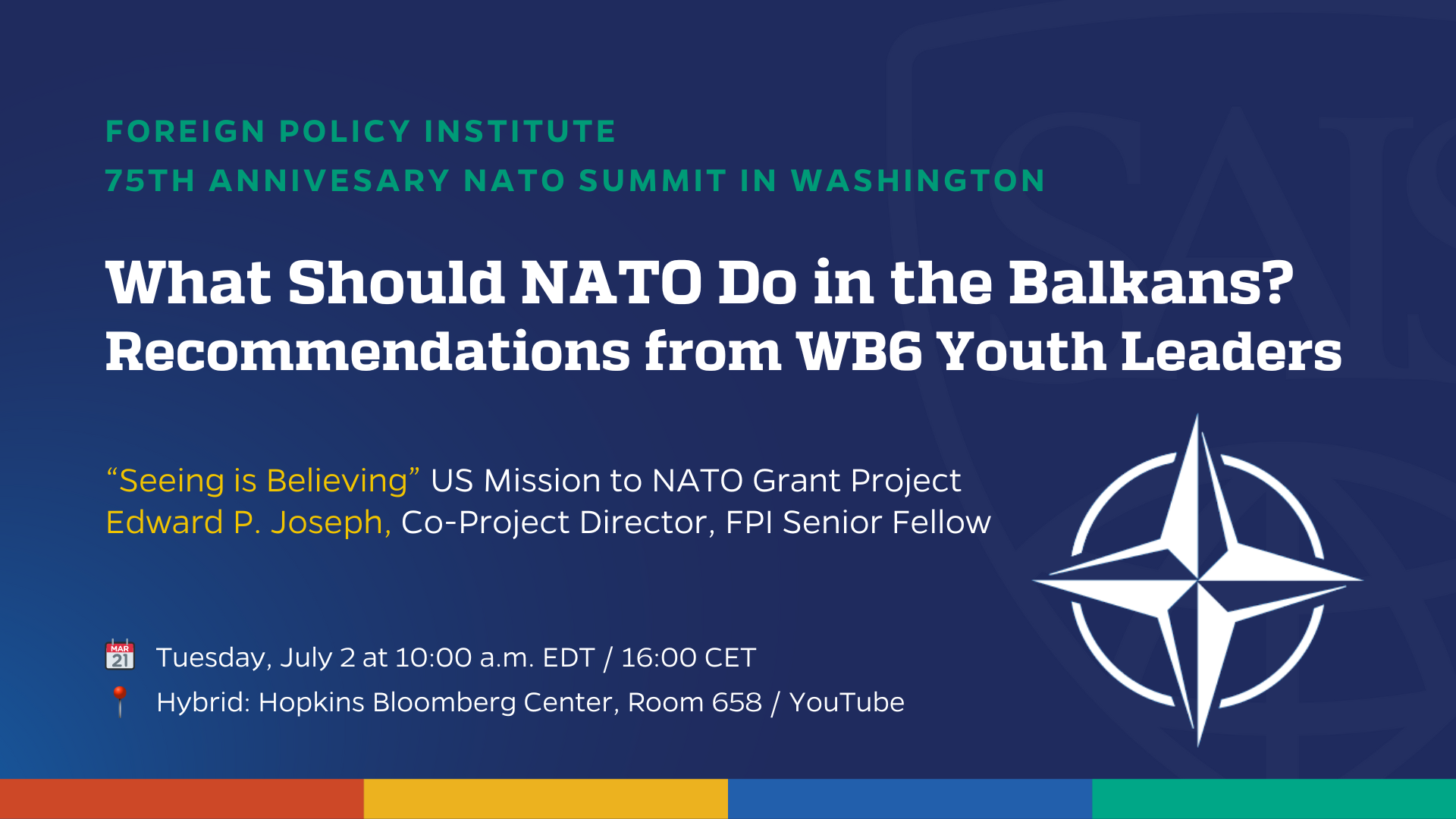
What Should NATO do in the Balkans? Recommendations from WB6 Youth Leaders
As NATO soon celebrates its 75th Anniversary in Washington, the Alliance also commemorates a Balkans milestone: the 25th Anniversary of the NATO Air Campaign over Kosovo. Serious attacks on NATO KFOR troops in May 2023, followed by an increase in KFOR's size, are reminders that the Balkans region remains fractious.
So what should the Alliance do to truly stabilize the region, resist Russian and other malign influence, and advance the prospects for Euro-Atlantic integration? Emerging Youth Leaders from across the WB6 have their answers!
Join us on Tuesday, 2 July at 10AM ET / 1600 CET on YouTube and in-person at the Hopkins Bloomberg Center as these young Balkans leaders and their SAIS counterparts present creative, impactful, and plausible ideas for NATO to consider.
This public presentation is the culmination of the 'Seeing is Believing' Project carried out under a grant from the US Mission to NATO.
FPI Senior Fellow Edward P. Joseph, who Co-Directs the 'Seeing is Believing' project, will host this unique event.
Please register on Eventbrite to attend in-person.
Hopkins Bloomberg Center, Room 658
555 Pennsylvania Avenue Northwest Washington, DC 20001
You can also watch our livestream on YouTube, no registration required.
You can also download the final report with the Youth Leaders’ recommendations.
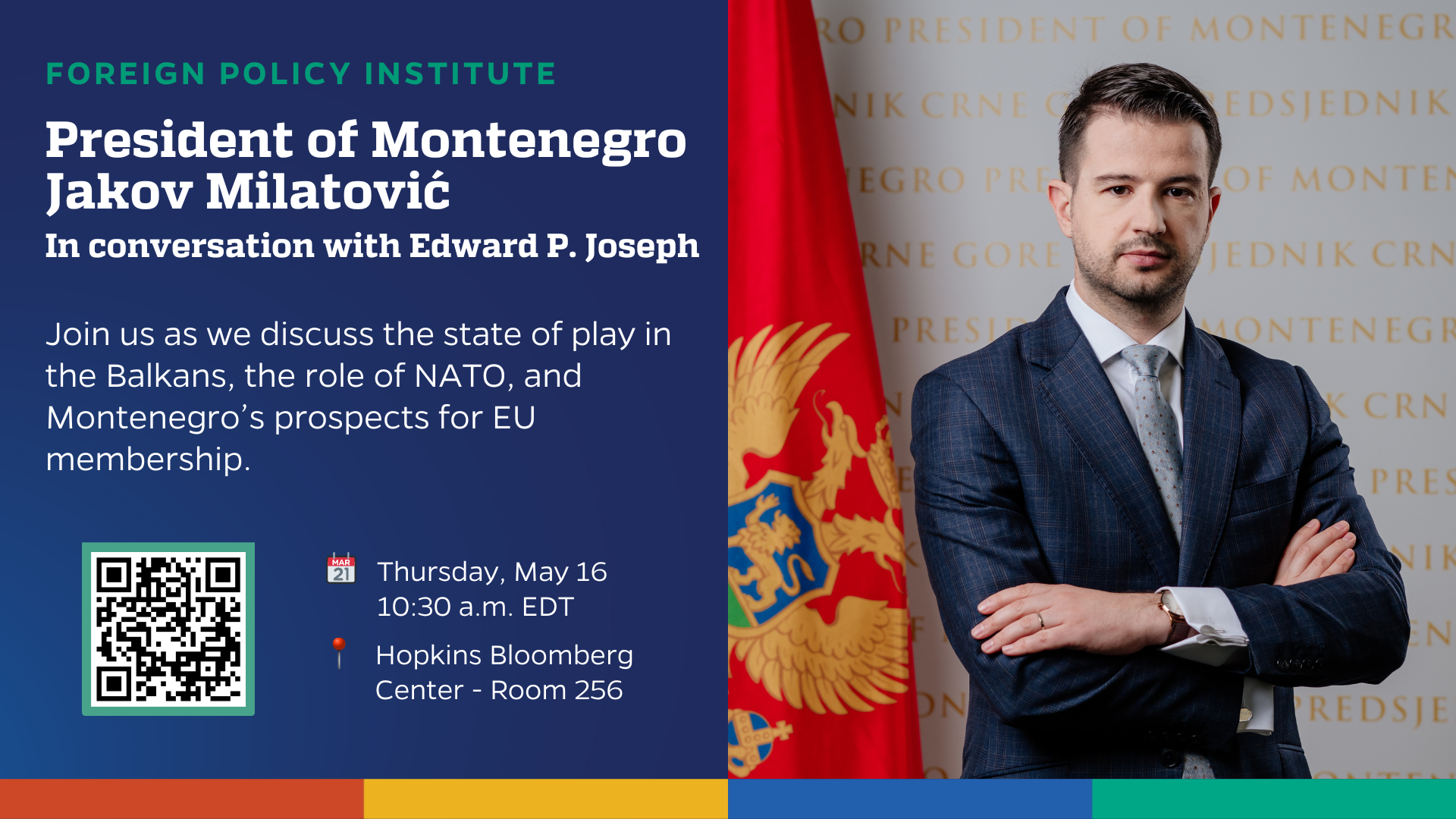
President of Montenegro Jakov Milatović
Join the Foreign Policy Institute at the Johns Hopkins School of International Studies as in a discussion between Jakov Milatović, President of Montenegro, and Edward P. Joseph, FPI Senior Fellow, about the state of play in the Balkans, the role of NATO, and Montenegro’s prospects for EU membership.
Hopkins Bloomberg Center, 555 Pennsylvania Ave, Room 256
Please register on Eventbrite to attend in person.
About the Speakers
Jakov Milatović was born in Podgorica on December 7, 1986.
He completed primary, secondary school and faculty in Podgorica. As a US government scholarship holder, he spent one academic year at Illinois State University. After that, he spent one semester at Vienna University of Economics and Business (WU Wien) as a scholarship holder of the Austrian Government. Under the auspices of the European Commission, he spent one year of study at La Sapienza University in Rome. He earned his master's degree in the field of economics at the University of Oxford and he was also awarded a scholarship by the British Government.
He attended programs organized by the United Nations in New York, German Konrad Adenauer Foundation, Embassy of Montenegro in Rome and Office for International Cooperation of the Faculty of Economics in Podgorica. He also attended the Oxbridge Academic Program at Oxford, and a number of International Monetary Fund (IMF) Programs in London, as well as London School of Economics (LSE) Programs. He also trained at the University of Beijing, University of Belgrade and Leadership Academy of Stanford University. He worked in the banking sector in the country and abroad. In the sector for economic and political analysis at the European Bank for Reconstruction and Development (EBRD), he dealt with the economic analysis of the region of Southeast Europe and countries of the Western Balkans. He worked in Bucharest as the EBRD's Chief Economic Analyst for Romania, Croatia, Slovenia and Bulgaria from 2018 to 2020.
In the fall of 2022, he was a guest lecturer at the Luxembourg Business School. He is the author of several professional papers and co-author of two books.
He was elected Minister of Economic Development in the 42nd Government of Montenegro in December 2020. In June 2022, he founded the Europe Now Movement! and he is one of the leaders of that movement. After the success of the electoral list he led in the local elections in Podgorica, he ran in the presidential elections. He assumed the office of President of Montenegro on May 20, 2023.
He speaks English, Italian and Spanish.
He is married and father of three children.
Edward P. Joseph is a Senior Fellow at the Foreign Policy Institute and Adjunct Lecturer at SAIS, specializing in Conflict Management. Edward served on the ground in the Balkans for a dozen years, including during the conflicts in each war-affected country: Bosnia-Herzegovina, Croatia, Kosovo, and then-Macedonia.
In 2012, as the US-nominated Deputy Head of the OSCE Mission in Kosovo, Edward negotiated the breakthrough agreement with Pristina and Belgrade to hold Serbian elections in independent Kosovo.
In July 1995, Edward and one UN colleague coordinated the evacuation of Zepa, close to neighboring Srebrenica.
In 1995-1996, Edward deployed with the NATO Implementation Force in Bosnia-Herzegovina as a US Army officer. He is a veteran and former Army helicopter pilot.
Edward has authored dozens of articles and reports on the region, including in SAIS Review. His June 2023 Foreign Policy article, ‘The United States is Creating a Kosovo Crisis’ described the overlooked obstacle to establishing autonomy for Kosovo Serbs. Edward was the lead author on the January 2021 SAIS-Wilson Center report explaining how the European non-recognizers (of Kosovo) stymie the entire region, and setting out a corrective strategy.
Edward has led and currently serves on the Board of the National Council on US-Libya Relations. Edward earned his J.D. at the University of Virginia School of Law, and his B.A. and M.A. from Johns Hopkins University, and its School of Advanced International Studies.
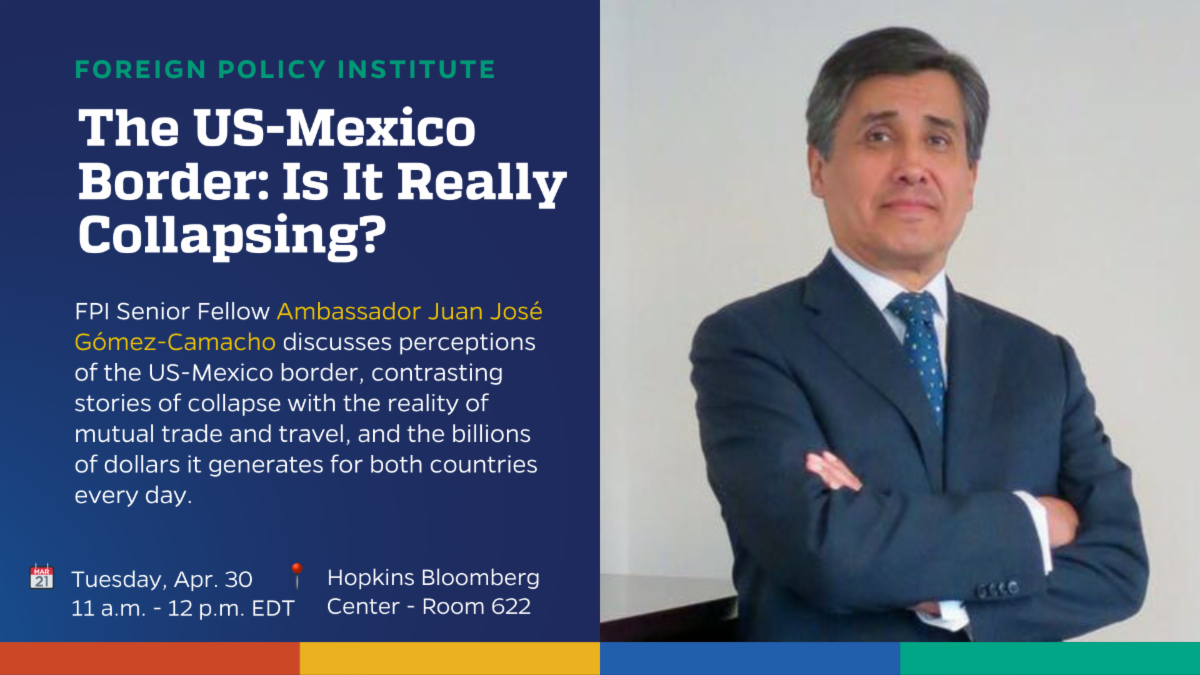
The US-Mexico Border: Is It Really Collapsing?
A surge in irregular migrants, asylum seekers, and fentanyl has put the US-Mexico border in the center of political debate and presidential campaigns in the United States, feeding a narrative that the border is somehow collapsing and that US national security is threatened. While those challenges are unquestionably real, there is a simultaneous reality that is completely absent from the current political and economic discussion: $1.5 million in goods produced in both countries cross the border every single minute—$2.2 billion every single day—supplying consumers and creating millions of jobs in the US and Mexico. Likewise, over a million legal border crossings, both south-to-north and north-to-south, also take place every day, contributing to the economy in the border region. The US-Mexico border is the busiest border on the planet.
This Lecture aims to put in perspective the political, economic, and social reality of the border; to discuss the challenges—and opportunities—both countries face; to consider what they are doing and have to do; and to reflect on the risks of misrepresenting the border for political gain.
RSVP on Eventbrite to attend in person:
About the Speaker
Ambassador Juan José Gómez-Camacho is a senior fellow at the Foreign Policy Institute, as well as a member of the teaching faculty of SAIS. Most recently he served as Ambassador of Mexico to Canada.
Prior to his current assignment he served as Ambassador to the Republic of Singapore and concurrently to the Union of Myanmar and the Sultanate of Brunei Darussalam (2006-2009); Ambassador and Permanent Representative to the International Organizations based in Geneva, Switzerland (2009-2013); Ambassador to the European Union as well as to the Kingdom of Belgium and the Grand Duchy of Luxembourg (2013-2016); and Ambassador and Permanent Representative to the United Nations in New York (2016-2019).
He is regarded as one of the most influential experienced Mexican diplomats, and is widely recognized for his strong leadership and for his analytical and negotiation skills. During his 30-year diplomatic career, he has played a key role in addressing and providing solutions to diverse and increasingly complex global challenges, both political and economic, for which government-centered-only alternatives are proving insufficient. Some of his major achievements include the conclusion of breakthrough international agreements on emerging global health challenges; the adoption of the first ever Global Deal on International Migration; the successful negotiation of the framework of the New Trade Agreement between Mexico and the European Union. Other important accomplishments include the negotiation and development of significant US-Mexico border infrastructures; and the design and implementation of the present Mexican foreign policy and legislation on Human Rights and Democracy.
He is highly recognized for his thorough understanding of North American relations, as well as North American–European Union relations, Latin America and Southeast Asia, on a multi-stakeholder basis.
He is a compelling communicator, including in the media, and is frequently invited as speaker in international conferences and events on diverse subjects. A Spanish mother tongue, he speaks English and French fluently.
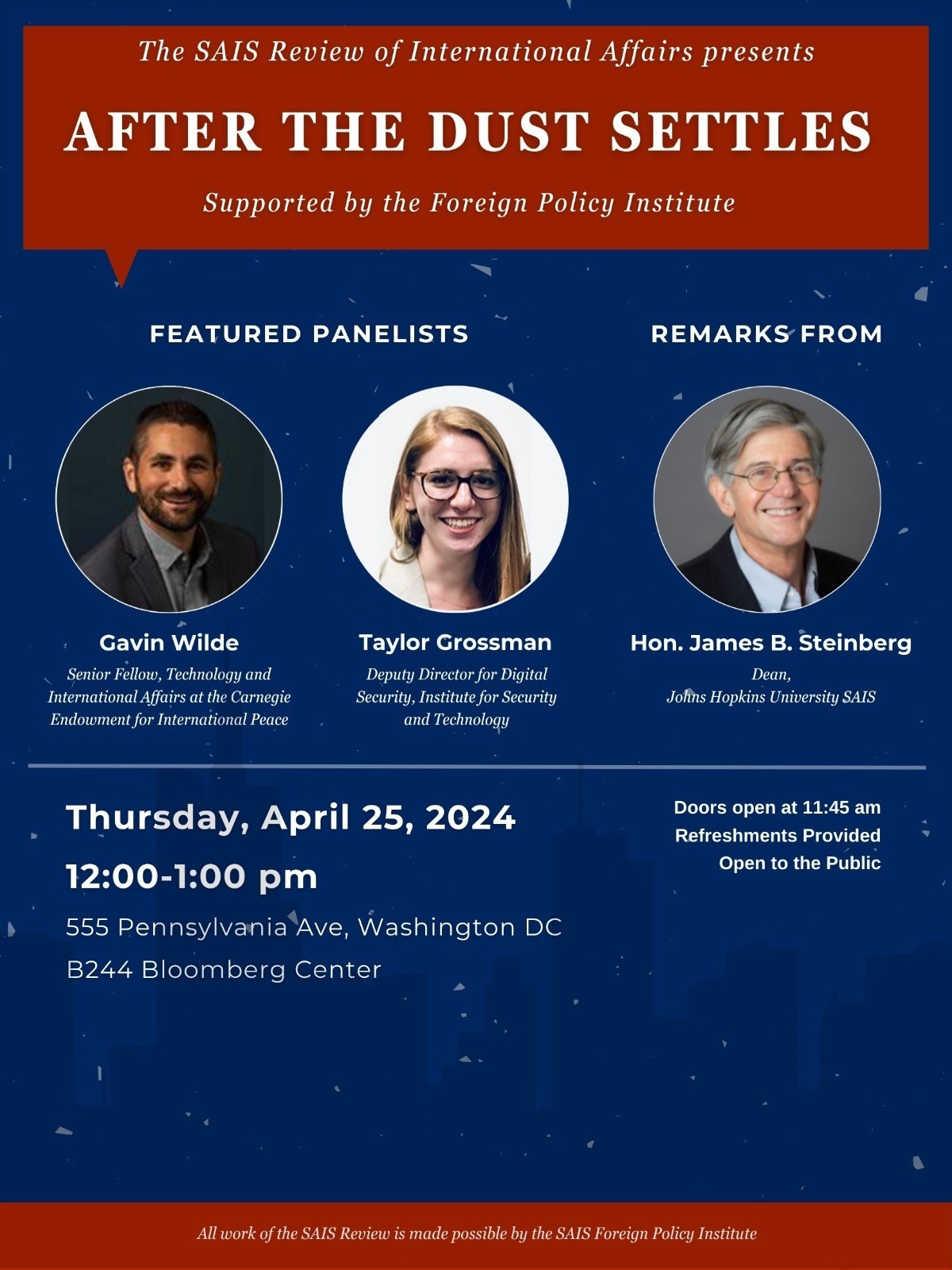
After the Dust Settles
Join the SAIS Review for the final launch event of the year! Professor Gavin Wilde of SAIS and the Carnegie Endowment and Taylor Grossman of the Institute for Security and Technology will be discussing the future of cyberspace in warfare through the lens of Western aid to Ukraine.
With remarks by James Steinberg, Dean of Johns Hopkins SAIS.
Supported by the SAIS Foreign Policy Institute.
RSVP on Eventbrite to attend in person (Room B244):
Or you can watch our livestream on YouTube, no registration required:
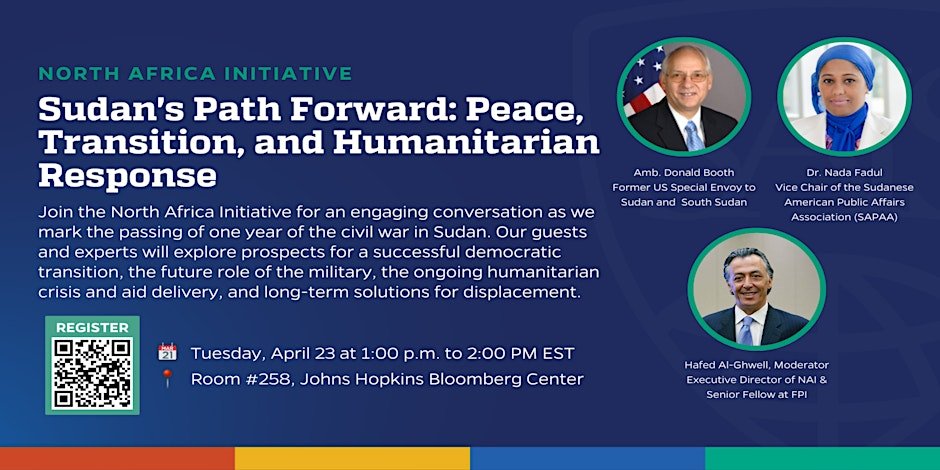
Sudan's Path Forward: Peace, Transition, and Humanitarian Response
Join the North Africa Initiative of Foreign Policy Institute (FPI) at the School of Advanced International Studies (SAIS) at Johns Hopkins University for a conversation with former Special Envoy for Sudan Ambassador Donald Booth, Dr. Nada Fadul, Vice Chair of the Sudanese American Public Affairs Association (SAPAA) and President of Sustainable Development Response Organization (SuDRO), and Fadi Abilmona, Regional Advisor for Sudan, Somalia, Djibouti, and Yemen at the United Nations Development Programme's Regional Bureau for Arab State to mark the passing of one year of the civil war in Sudan. Our guests and experts will explore prospects for a successful democratic transition, the future role of the military, the ongoing humanitarian crisis and aid delivery, and long-term solutions for displacement. The conversation will be moderated by FPI Senior Fellow and Executive Director of NAI, Hafed Al-Ghwell.
Lunch provided.
Register via Eventbrite to attend in person,
Or you can watch our livestream on YouTube, no registration required
About the Speakers
Ambassador (Ret) Donald E. Booth
Donald E. Booth, a former member of the U.S. Senior Foreign Service, served as U.S. Presidential Special Envoy for Sudan and South Sudan from August 2013 until January 2017, during which he helped negotiate the 2015 Agreement for the Resolution of the Conflict in South Sudan and secured changes in Sudanese policy that resulted in the lifting of bilateral sanctions in 2017. He was recalled as Special Envoy for Sudan in 2019 and helped facilitate international support for Sudan’s transitional government, Sudan’s removal from the U.S.’ “State Sponsor of Terrorism” list and conclusion of a peace agreement with armed groups from Darfur and other marginalized areas of Sudan. He retired in August 2021. Ambassador (Ret) Booth also previously served as Ambassador of the United States of America to the Federal Democratic Republic of Ethiopia from 2010-2013, Ambassador to the Republic of Zambia from 2008-2010 and Ambassador to the Republic of Liberia from 2005-2008. Prior to that, he was Director of the Office of Technical and Specialized Agencies at the Department of State's Bureau of International Organization Affairs where he negotiated international agreements and U.S. re-entry into UNESCO. He also served as Director of the Office of West African Affairs, Deputy Director of the Office of Southern African Affairs, and Division Chief for Bilateral Trade Affairs at the Department of State. He served as a desk officer in the Office of Egyptian Affairs and as Sudan and Uganda desk officer in the Office of East African Affairs. His State Department career also included postings as economic counselor in Greece (1996-98) and Romania (1989-91) and at embassies in Belgium, Liberia and Gabon.
Ambassador (Ret) Booth earned a bachelor's degree in Foreign Service from Georgetown University, a master's degree in Business Administration from Boston University and a master's degree in National Security Studies from the National War College where he was a Distinguished Graduate.
Ambassador (Ret) Booth was an advisor to the Carter Center’s Sudan and U.S.-China-Africa Cooperation programs (2018-19). He was also a Carter Center volunteer election observer for the August 2017 Kenyan election. Ambassador (Ret) Booth is a member of the American Academy of Diplomacy and Diplomats Without Borders. Since August 2022, has been co-chair of the Woodrow Wilson Center’s “Sudans Working Group.” He has lectured periodically to university classes and volunteers regularly with Habitat for Humanity and Re-Building Together in northern Virginia.
Dr. Nada Fadul
Nada Fadul is a Professor of Medicine at the Division of Infectious Diseases and Assistant Dean for DEI Education Programs at the University of Nebraska Medical Center (UNMC). She is the Medical Director of the UNMC’s Specialty Care Center (UNMC SCC) HIV Program and the Principal Investigator of the Ryan White Parts C&D grants. Dr. Fadul is the founder and President of the Sustainable Development Response Organization and founded the Sudan ECHO Center of Excellence. She currently serves as the Chair of the Awards Committee and a Board of Director for the HIV Medical Association. She is also a member of the Quality Improvement Committee of the Infectious Diseases Society of America (IDSA), and serves as an IDSA advocacy liaison where she meets with policymakers to advocate for HIV care and prevention. Dr. Fadul's research focuses on implementation science driven approaches to HIV care and health services research focusing on HIV disparities. She has received federal and private grant funding, published in peer-reviewed journals, presented her research at national and international conference, and mentored dozens of students and trainees. She is active in global health and currently runs the UNMC Sudan ECHO Global Hub, a telementorship platform which disseminates knowledge to healthcare professionals in underserved regions. Dr. Fadul’s local and global work emphasizes community engagement, cultural sensitivity, and health equity. She is active in advocacy for humanitarian issues facing Sudan and volunteers at several local and national community and professional organizations; She enjoys writing Arabic poetry, reading, and traveling with her family.
Fadi Abilmona
Fadi Abilmona is a Regional Advisor for Sudan, Somalia, Djibouti, Yemen, at the Regional Bureau for Arab States, United Nations Development Programme.
Hafed Al-Ghwell, Moderator
Hafed Al-Ghwell is a senior fellow and executive director of the North Africa Initiative at the SAIS Foreign Policy Institute (FPI).
Prior to his current role at the Foreign Policy Institute, Hafed Al-Ghwell has had a long, notable career serving in multiple distinct roles as a consultant, advisor, fellow and scholar in world-renowned think tanks, policy institutes and advisory bodies. At the Atlantic Council, Oxford Analytica, Maxwell Stamp Inc. and Foreign Reports, to list a few, Hafed Al-Ghwell specialized in the political economies of the Middle East and North Africa countries, government affairs, international relations, geopolitics and geostrategic risks. This wealth and breadth of experience dates back to his early days at the International Monetary Fund (IMF) in the 1980s, followed by a career spanning nearly two decades at the World Bank where he took on multiple roles in senior leadership and ultimately as an Advisor to the Dean of the Board of Executive Directors until the end of 2015. He was also a Director of External Affairs and Communication, and part of the senior management team at the Mohammed Bin Rashid School of Government—in partnership with Harvard University's John F. Kennedy School of Government until 2009.
Aside from being a featured Arab voice in the Washington, D.C., policy and consultancy circuit, Hafed Al-Ghwell is also a veteran commentator and widely published columnist. His perspectives and analyses are published and televised in several languages across a wide spectrum of international media, notably the Wall Street Journal, BBC, Financial Times and Arab News, the oldest English language daily in the Arab world.
Hafed Al-Ghwell is an alumnus of George Washington University, Harvard University and Stanford University. He is also a recipient of numerous accreditations from the World Bank Group's management executive programs, focusing on public policy and global economic development.
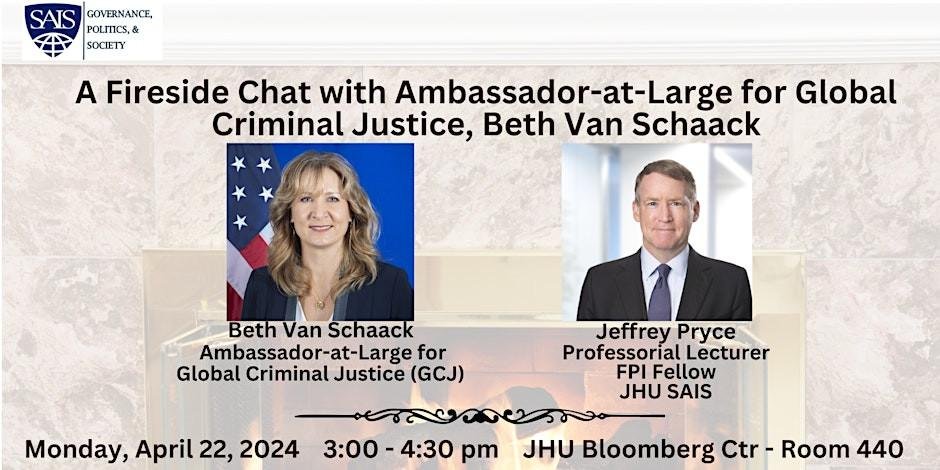
A Fireside Chat with Beth Van Schaack, US Ambassador-at-Large for Global Criminal Justice
The SAIS GPS Focus Area and the Foreign Policy Institute invite you to A Fireside Chat with Beth Van Schaack, US Ambassador-at-Large for Global Criminal Justice, a conversation with Professor Jeffrey Pryce (JHU SAIS), former Counselor, OSD.
Ensuring accountability for war crimes, crimes against humanity and aggression has emerged as a critical issue in crises like Russia’s invasion of Ukraine. Ambassador Van Schaack, who leads the United States efforts in international criminal justice, will engage on US efforts to ensure accountability in Ukraine, Africa, and Central America.
Date and Time
Monday, April 22, 2024 · 3:00-4:30pm
Location
JHU Bloomberg Center - Room 440
555 Pennsylvania Ave NW
Washington, DC 20001
Please RSVP: https://GPS-ChatwithVanSchaack.eventbrite.com
About the Speakers
Dr. Beth Van Schaack was sworn in as the Department’s sixth Ambassador-at-Large for Global Criminal Justice (GCJ) on March 17, 2022. In this role, she advises the Secretary of State and other Department leadership on issues related to the prevention of and response to atrocity crimes, including war crimes, crimes against humanity, and genocide.
Ambassador Van Schaack served as Deputy to the Ambassador-at-Large in GCJ from 2012 to 2013. Prior to returning to public service in 2022, Ambassador Van Schaack was the Leah Kaplan Visiting Professor in Human Rights at Stanford Law School, where she taught international criminal law, human rights, human trafficking, and a policy lab on Legal & Policy Tools for Preventing Atrocities. In addition, she directed Stanford’s International Human Rights & Conflict Resolution Clinic. Ambassador Van Schaack began her academic career at Santa Clara University School of Law, where, in addition to teaching and writing on international human rights issues, she served as the Academic Adviser to the United States interagency delegation to the International Criminal Court Review Conference in Kampala, Uganda. Earlier in her career, she was a practicing lawyer at Morrison & Foerster, LLP; the Center for Justice & Accountability, a human rights law firm; and the Office of the Prosecutor of the International Criminal Tribunals for Rwanda and the Former Yugoslavia in The Hague.
Ambassador Van Schaack has published numerous articles and papers on international human rights and justice issues, including her 2020 thesis, Imagining Justice for Syria (Oxford University Press). From 2014 to 2022, she served as Executive Editor for Just Security, an online forum for the analysis of national security, foreign policy, and rights. She is a graduate of Stanford (BA), Yale (JD) and Leiden (PhD) Universities.
Jeffrey Pryce is Professorial Lecturer of the Foreign Policy Institute at the Johns Hopkins School of Advanced International Studies (SAIS), where he focuses on international security and international law. He teaches International Crises and International Law, and previously taught a seminar on the role of international tribunals in dispute resolution. He is also a practicing international lawyer, and has successfully represented clients in major investment treaty, international commercial arbitration and multijurisdictional litigation cases. He previously served in the Department of Defense as Special Counsel for International Affairs, then as Counselor to the Undersecretary for Policy. He was particularly engaged in policy toward and response to crises involving Bosnia, Russia, NATO, Iraq, Haiti, and North Korea. He negotiated nuclear disarmament agreements with Russia, Ukraine, Kazakhstan and Belarus. He also served as delegation leader or senior DoD representative to significant multilateral negotiations impacting international security. He began his career working for 5 years in the offices of Sen. Kennedy and Congressman Markey on issues of nuclear arms control, defense, regional armed conflicts and human rights. He received a BA in Philosophy from Wesleyan; an M.Phil in International Relations from Cambridge, where he was the founder and first Editor-in-Chief of the CAMBRIDGE REVIEW OF INTERNATIONAL AFFAIRS; and a JD from Yale Law School, where he was an editor of the YALE LAW JOURNAL. He served as a two-year law clerk to Supreme Court Justice Byron White. Among other outlets, his commentary has appeared on NPR; VOA Television; ABC News; and Univisión Radio (in English and Spanish). He has served on the Board of Directors of the Washington Institute of Foreign Affairs and the Cambridge Society of Washington DC.
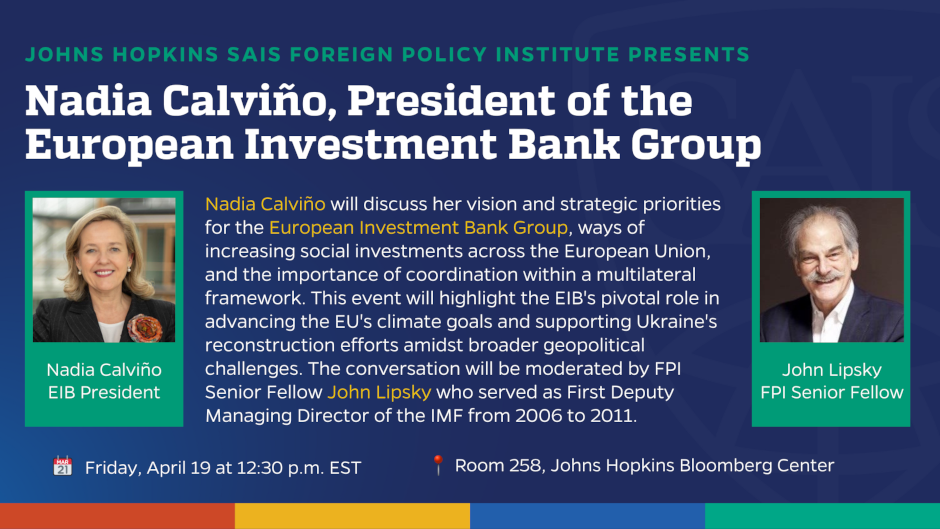
Nadia Calviño, President of the European Investment Bank Group
About this event
Join the Foreign Policy Institute (FPI) of the School of Advanced International Studies (SAIS) at Johns Hopkins University for a conversation with the new President of the European Investment Bank Group (EIB) Nadia Calviño. President Calviño will discuss her vision and strategic priorities for the EIB, ways of increasing social investments across the European Union (EU), and the importance of coordination within a multilateral framework.
On the occasion of the Spring Meetings of the World Bank Group and the International Monetary Fund, the event will highlight the EIB's pivotal role in advancing the EU’s climate goals and supporting Ukraine's reconstruction efforts amidst broader geopolitical challenges. The conversation will be moderated by FPI Senior Fellow John Lipsky who served as First Deputy Managing Director of the IMF from 2006 to 2011.
To attend in person, please register via Eventbrite.
About the Speakers
Nadia Calviño is the President of the European Investment Bank Group, and a Spanish economist and lawyer with a 30+ year career in public policy, economics, and finance. Ms. Calviño served as First Vice-President of Spain and Minister of Economy, Trade, and Enterprise until December 2023. Prior to that role, she held various positions, including Second Vice-President and Minister for Economy and Digitalization (March-July 2021), Third Vice-President and Minister for Economy and Digitalization (2020-2021), and Minister for Economy and Business (2018-2020). Additionally, she chaired the International Monetary and Financial Committee (IMFC) of the International Monetary Fund from 2022 to 2023. Before joining the Spanish government, Ms. Calviño worked for 12 years at the European Commission, first as Deputy Director General for Competition and Financial Services, and later as Director General responsible for the EU Budget. Her earlier career in Spain encompassed different roles as a civil servant at the Ministry for Economy, focusing on areas such as macroeconomic analysis, economic policy, foreign trade and competition law. Ms. Calviño holds a degree in economics from the Universidad Complutense de Madrid and a degree in law from the Universidad Nacional de Educación a Distancia.
John Lipsky is a Senior Fellow at the Foreign Policy Institute of the Johns Hopkins University School of Advanced international Studies (SAIS), and is the Chair of the Hopkins Nanjing Council. Before joining SAIS, he served as First Deputy Managing Director of the International Monetary Fund from 2006-2011. Previously, he served as Vice Chairman of JPMorgan Investment Bank, Chief Economist of JPMorgan Chase, Chief Economist and Director of Research of Chase Manhattan Bank, and Chief Economist of Salomon Brothers. Currently, Lipsky is Co-Chair of the Aspen Institute's Program on the World Economy, and is the Executive Committee Vice-Chair of the Center for Global Development. He also serves on the Executive Committee of the National Bureau of Economic Research, on the Advisory Board of the Stanford Institute for Economic Policy Research (SIEPR), and as a Director of the American Council on Germany and of the Krymov Foundation. He is a life member of the Council on Foreign Relations. Lipsky received his Ph.D. in Economics from Stanford University.

Women Who Inspire - Dame Louise Richardson: Removing Barriers Between Scholarship and Policymaking
Now, more than ever, we need policies based on evidence. Our universities are replete with scholars conducting in-depth dispassionate research. Yet too often the research never reaches policy makers. How do we bridge this gap? Dame Louise Richardson explores the barriers between scholarship and policy makers and suggests ways to remove those barriers and improve the quality of public policy.
A conversation with Ambassador Shirin Tahir-Kheli, Senior Fellow at the SAIS Foreign Policy Institute.
With introductory remarks by James Steinberg, Dean of John Hopkins SAIS.
RSVP on Eventbrite to attend in person or watch our livestream on YouTube, no registration required.
About the Speakers
Dame Louise Richardson DBE
Dame Louise Richardson DBE is president of Carnegie Corporation of New York, the philanthropic foundation established by Andrew Carnegie in 1911. Previously, she served as vice-chancellor of the University of Oxford and of the University of St. Andrews, and as executive dean of the Radcliffe Institute for Advanced Study.
A native of Ireland, she studied history in Trinity College Dublin before gaining her PhD at Harvard University, where she spent 20 years on the faculty of the Department of Government, teaching courses on international security and foreign policy. She currently sits on numerous advisory boards, while serving as a trustee of, among others, the Booker Prize Foundation and the Sutton Trust. Richardson is also a member of the selection committee of the Aurora Prize for Awakening Humanity. In 2023, the Irish government asked Richardson to serve as the independent chair of its Consultative Forum on International Security Policy.
A political scientist by training, Richardson is recognized internationally as an expert on terrorism and counterterrorism. Today considered a seminal work in the field, her groundbreaking study, What Terrorists Want: Understanding the Enemy, Containing the Threat (2006), was hailed by the New York Times Book Review as an “overdue and essential primer on terrorism and how to tackle it … the book many have been waiting for.” Other publications include Democracy and Counterterrorism: Lessons from the Past (2007), The Roots of Terrorism (2006), and When Allies Differ: Anglo-American Relations during the Suez and Falklands Crises (1996). She has written numerous articles on international terrorism, British foreign and defense policy, security institutions, and international relations; lectured to public, professional, media, and education groups; and served on editorial boards for several journals and presses.
Richardson’s many awards have recognized the excellence of her teaching and scholarship, including the Centennial Medal bestowed on her in 2013 by Harvard’s Graduate School of Arts and Sciences for “having the vision to assess emerging threats, for transformative leadership, and for moving seamlessly between the roles of scholar and teacher.” She has been awarded ten honorary doctorates, including from the universities of Aberdeen, Edinburgh, and St. Andrews in Scotland; Trinity College Dublin and Queen’s University Belfast in Ireland; the University of Notre Dame in the U.S.; the University of the West Indies; Ben Gurion University of the Negev in Israel; the Moscow State Institute of International Relations (MGIMO) in Russia, and Université Grenoble Alpes in France. Richardson is a member of the American Academy of Arts and Sciences, the American Philosophical Society, and the Academy of Social Sciences in the United Kingdom, as well as an honorary member of the Royal Irish Academy and a fellow of the Royal Society of Edinburgh.
In June 2022, Richardson was appointed a Dame Commander of the Most Excellent Order of the British Empire (DBE) in recognition of her services to higher education.
Ambassador Shirin Tahir-Kheli
Dr. Shirin Tahir-Kheli is a Senior Fellow and Founding Director of the South Asia Program at the Foreign Policy Institute of the Johns Hopkins University School of Advanced International Studies (SAIS). She was Research Professor of International Relations. In 2011, Tahir-Kheli was named by Newsweek as one of the "150 Women Who Shake the World." She specializes in South Asia, nuclear non-proliferation, United Nations and U.S. foreign policy, and women's empowerment.
From 2003 to 2005, she served as Special Assistant to the President and Senior Director for Democracy, Human Rights and International Operations at the National Security Council. She proposed and coordinated the building of the Children's Hospital for treatment of Cancer in Basra, Iraq from 2004 to 2009. From 2004 to 2006, she served as the key U.S. official in the formulation of U.S. policy toward United Nations reform. She oversaw the diplomatic effort to press for critical changes in the UN system from her position as Senior Director for Multilateral Affairs at the National Security Council and later as Senior Advisor to the Secretary of State for UN Reform.
Shirin Tahir-Kheli was appointed by Secretary Condoleezza Rice as her Senior Advisor for Women’s Empowerment in 2006. There, she established the first ever office focused on integrating Women's Empowerment into U.S. foreign policy. She set up and oversaw the work of the Women Leaders' Working Group, comprising 60 female heads of state, foreign ministers, political leaders, attorney generals and speakers of parliaments, focused on political participation, education, economic empowerment and justice. Tahir-Kheli spearheaded the State Department initiative for "Women's Justice" at the Department of State in 2008, through which judges from around the world worked on measures to alleviate the severity of violence against women and women's lack of access to justice, which continues.
Earlier, during her service in the United States government, Tahir-Kheli served as Head of the United States delegation to the United Nations Commission on Human Rights in Geneva in 2001;, Alternate United States Representative to the United Nations for Special Political Affairs (1990–1993), a post that carries the rank of Ambassador, Member of the United States Presidential Commission on the Public Service (1992–1993), Director of Near East and South Asian Affairs (1986-1989) and Director of Political Military Affairs (1984–1986) at the National Security Council. She joined the Reagan Administration in 1982 as Member, Policy Planning Staff in the Office of the Secretary of State.
Ambassador Tahir-Kheli has dedicated her efforts to finding areas of agreement between India and Pakistan that could change their relationship to one of productive peace. Toward that end, she has been chair of the BALUSA Group comprising senior Indian, Pakistani, and U.S. participants that is geared to influencing policy toward cooperation.
She is the author and editor of several monographs, including: "Before the Age of Prejudice: A Muslim Woman’s National Security Work with Three American Presidents, A Memoir," (Macmillan, 2018); "Pakistan Today: The Case for U.S.-Pakistan Relations" (with Shahid Javed Burki, Foreign Policy Institute, 2017); "Manipulating Religion for Political Gain in Pakistan: Consequences for the U.S. and the Region" (Foreign Policy Institute, 2015); and "India, Pakistan and the United States: Breaking with the Past" (Council on Foreign Relations, 1997).
Tahir-Kheli has a B. A. From Ohio Wesleyan University and an M.A. and Ph.D from the University of Pennsylvania.
Dean James Steinberg
The Honorable James B. Steinberg is University Professor of Social Science, International Affairs and Law at Syracuse University, where he was Dean of the Maxwell School from July 2011 until June 2016. Prior to becoming Dean he served as Deputy Secretary of State, the principal deputy to Secretary Hillary Rodham Clinton, from 2009-2011. From 2005-2008, Steinberg was Dean of the Lyndon B. Johnson School of Public Affairs. From 2001 to 2005, Mr. Steinberg was vice president and director of Foreign Policy Studies at the Brookings Institution.
Mr. Steinberg was deputy national security advisor to President Clinton from 1996 to 2000. During that period he also served as the president’s personal representative to the 1998 and 1999 G-8 summits. Prior to becoming deputy national security advisor, Mr. Steinberg held positions as director of the State Department’s Policy Planning Staff, and as Deputy Assistant Secretary for Analysis in the Bureau of Intelligence and Research. He is the recipient of the Joseph J. Kruzel Memorial Award, American Political Science Association (2014), the CIA Director’s Medal (2011) and the Secretary of State’s Distinguished Service Award (2011).
Steinberg’s most recent books are A Glass Half Full? Rebalance, Reassurance and Resolve and Strategic Reassurance and Resolve: US-China Relations in the 21st Century (both with Michael O’Hanlon). Recent book chapters include “Present at the Recreation: The Role of the State Department in Formulating and Implementing US Global Policy” in Nicholas Burns and Jonathan Price, eds., America’s National Security Architecture (Aspen Institute, 2016); “United States: Grappling with Rising Powers” in William I. Hitchcock, Melvyn P. Leffler and Jeffrey W. Legro, eds., Shaper Nations: Strategies for a Changing World (Harvard University Press, 2016) and “History, Policymaking, and the Balkans: Lessons Imported and Lessons Learned” in Hal Brands and Jeremi Suri, eds., The Power of the Past, History and Statecraft, (Brookings Institution Press, 2015). He has also authored Difficult Transitions: Foreign Policy Troubles at the Outset of Presidential Power (Brookings 2008) with Kurt Campbell.
Mr. Steinberg received his A.B from Harvard College and a J.D. from Yale Law School. He is married to Sherburne Abbott, University Professor at Syracuse University. They have two children, Jenna and Emma Steinberg.
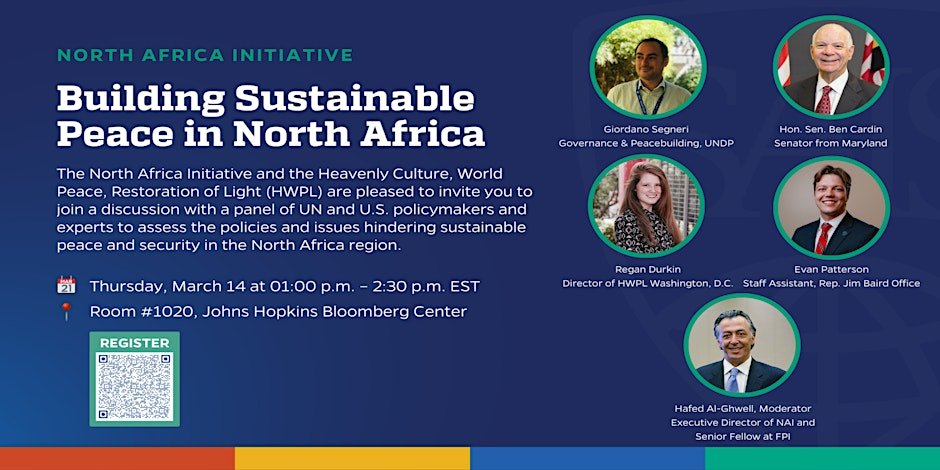
Building Sustainable Peace in North Africa
The North Africa Initiative (NAI) at Foreign Policy Institute (FPI) of the Johns Hopkins University School of Advanced International Studies (SAIS) and the Heavenly Culture, World Peace, Restoration of Light (HWPL) are honored to host a panel of experts to discuss the institutionalization of peace in North Africa. The event would include speakers from Congress, the UN, and NGOs to discuss and evaluate solutions to policy that sustain peace. The solutions identified would be translated into a report to be submitted to the United Nations to further aid in peace obtaining efforts in the North African Region.
Lunch will be provided.
Register on Eventbrite for in-person attendance.
Panelists:
The Honorable Ben Cardin, Senator from Maryland
Giordano Segneri, Governance and Peacebuilding Team Leader for Arab States, UNDP
Evan Patterson, Staff Assistant, U.S. House of Representatives Congressman Jim Baird (R-IN)
Regan Durkin, Director of HWPL Washington, D.C.
Hafed Al-Ghwell (Moderator), Executive Director of the North Africa Initiative (NAI) and Senior Fellow at the SAIS Foreign Policy Institute (FPI).

Water Wars: Conflict and Diplomacy
Join the SAIS Review of International Affairs in the launch its Summer-Fall 2023 journal: “Water Wars: Conflict and Diplomacy” on February 29. The event is sponsored by the SAIS Foreign Policy Institute North Africa Initiative.
Register on Eventbrite to attend in person. Follow the livestream on Youtube (no registration required.)
Featured Panelists
David Michel - Senior Fellow for Water Security with the Global Food and Water Security Program at the Center for Strategic and International Studies
Luke Wilson - Co-founder and Deputy Director of the Center for Water Security and Cooperation at George Washington University
Areig Elhag (Moderator) - Journalist and TV presenter at the Middle East Broadcasting Networks
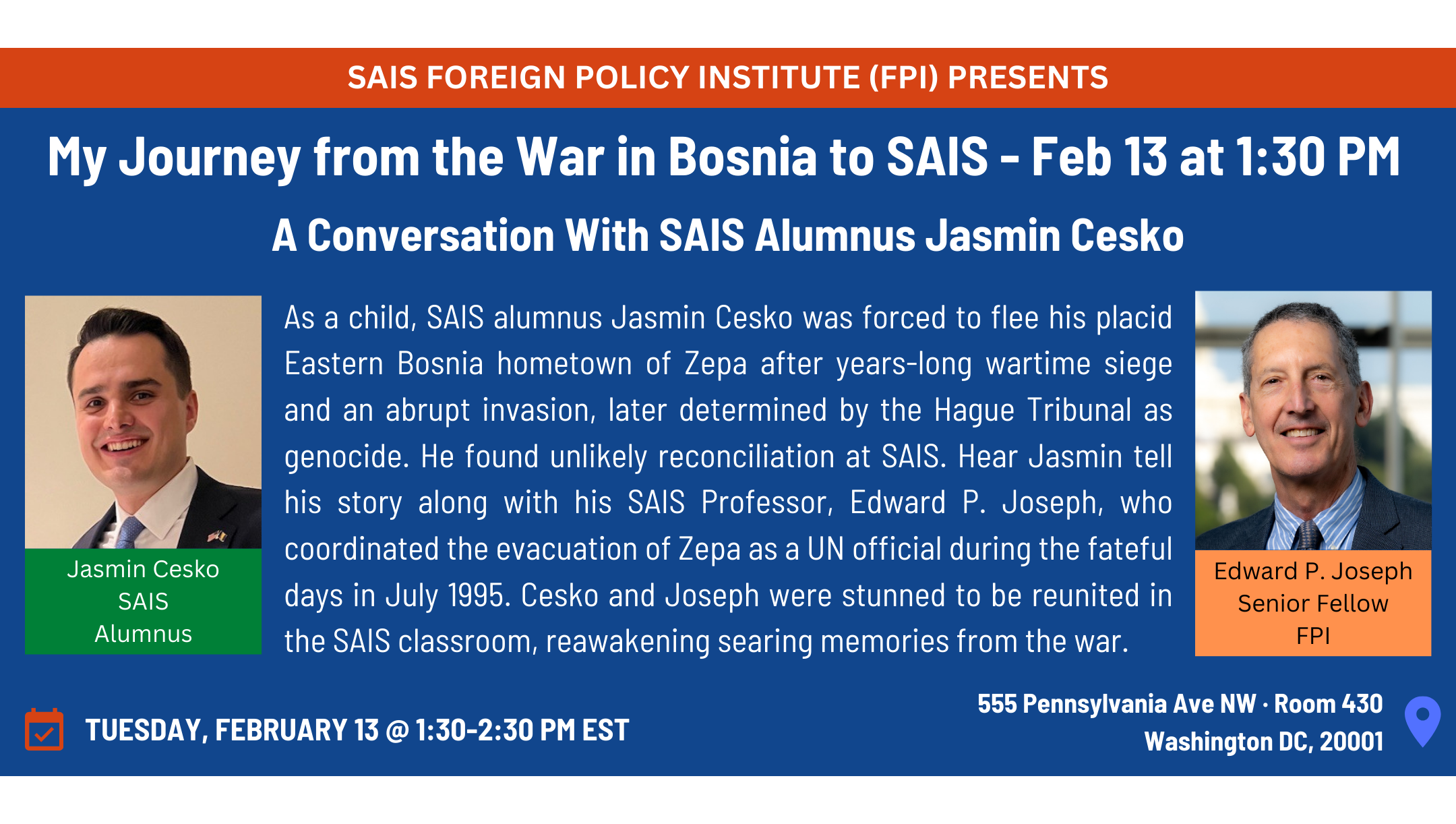
My Journey from the War in Bosnia to SAIS
Join the Johns Hopkins School of Advanced International Studies (SAIS) Foreign Policy Institute (FPI) in a conversation with alumnus Jasmin Cesko about his experience fleeing Bosnia in 1995. Hear Jasmin tell his story along with his SAIS Professor, Edward P. Joseph, who coordinated the evacuation of Zepa as a UN official during the fateful days in July 1995.
To attend in person, please register via Eventbrite or watch on YouTube with this link.
About the Speakers
Jasmin Cesko was born in Sarajevo, Bosnia and Herzegovina, and raised in the eastern Bosnian town of Zepa, surviving war and genocide in his early childhood years. Arriving in the United States at the age of 10, Jasmin, his parents, and two younger siblings made New Hampshire home where they contributed to establishing the Association of Bosniaks of New Hampshire (ABNH). He later graduated with a bachelor’s in Political Science and International Affairs from the University of New Hampshire and a master’s in International Relations and European and Eurasian Studies from SAIS.
He now works as the Policy Lead in the Office of Policy and Program Analysis at the Federal Emergency Management Agency (FEMA) in Washington, DC and is a passionate humanitarian. Jasmin has focused his career to advance innovative solutions to help protect people and infrastructure from the impacts of climate change and to advocate for the most vulnerable communities. He has deployed to the field in multiple disaster areas across the United States to coordinate and deliver aid.
Jasmin’s professional career is complimentary to his community leadership role as the co-founder of the American-Bosnian Coalition, an organization dedicated to building a network of Bosnian-American communities and strengthening ties between the United States and Bosnia and Herzegovina.
He is married and resides in Northern Virginia with his wife, Amina and six-month old son, Halil.
Edward P. Joseph is a Senior Fellow at the Foreign Policy Institute and Adjunct Lecturer at SAIS, specializing in Conflict Management. During the wars in former Yugoslavia, Edward served on the ground in each conflict-afflicted country: Bosnia-Herzegovina, Croatia, Kosovo and then-Macedonia.
During his war-time service in Bosnia-Herzegovina, in July 1995, Edward and one other UN Civil Affairs Officer were sent to Zepa to coordinate the evacuation of the women, children and wounded. This took place contemporaneous with the genocide in nearby Srebrenica. Edward testified as a fact witness in two Hague Tribunal cases.
Edward has authored dozens of articles and reports on the region, including in SAIS Review. His June, 2023 Foreign Policy article, ‘The United States is Creating a Kosovo Crisis’ described the overlooked obstacle to establishing autonomy for Kosovo Serbs. Edward was the lead author on the January, 2021 SAIS-Wilson Center report explaining how the European non-recognizers (of Kosovo) stymie the entire region, and setting out a corrective strategy.
Edward has led and currently serves on the Board of the National Council on US-Libya Relations. Edward earned his J.D. at the University of Virginia School of Law, and his B.A. and M.A. from Johns Hopkins University, and its School of Advanced International Studies.

North Macedonia's Deputy PM Slavica Grkovska: Why Is it So Hard to Fight Corruption in My Country?
Why is it – after decades of anti-corruption programs and pressure for reforms – that corruption, apparently, remains such a feature in the Macedonian system? Join the SAIS Foreign Policy Institute on February 2 in a conversation with Macedonian Deputy Prime Minister for Good Governance Slavica Grkovska. FPI Senior Fellow Edward P. Joseph, who authored a major report on corruption in North Macedonia, will moderate this important conversation.
Register on Eventbrite or follow the livestream on Zoom.
About the Speakers
Slavica Grkovska was born on July 27th, 1970, in Skopje. She graduated from the Faculty of Natural Sciences and Mathematics in Skopje and later she obtained the title Master of Science in Mathematics.
In the period 1995-2002 she worked as junior assistant in mathematics at the Institute of Mathematics within the Faculty of Natural Sciences and Mathematics.
Afterwards, 2002-2011 she was Member of the Parliament of the Republic of Macedonia.
During her term as an MP, she was president of the Commission on Education, Science and Sports, member of the Foreign Affairs Committee and deputy member of the Committee on European Affairs. Furthermore, she was deputy president of the Joint Parliamentary Committee in the EU-Republic of Macedonia.
In the period 2013-2014 she worked as chief administrative director additionally responsible for human resources and legal affairs in the company for information technologies “EIN-SOF LLC”.
As of March 2015, Grkovska worked as human resources management in the IT company “VOX Teneo Macedonia DOO”. In the period 2008-2021 she was appointed head of the human resources department for Belgium, Indonesia, and North Macedonia within the same company.
In the period between May 2021 until her appointment as Deputy Prime Minister in charge of good governance policies in the Government of the Republic of North Macedonia, she was the chief systemic analyst in the Sector for Information Technology, department of informatics and telecommunications in the Ministry of the Interior.
Edward P. Joseph is a Senior Fellow at the Foreign Policy Institute and Adjunct Lecturer at SAIS, specializing in Conflict Management. During the wars in former Yugoslavia, Edward served on the ground in each conflict-afflicted country: Bosnia-Herzegovina, Croatia, Kosovo and then-Macedonia.
In May, 2012, as the US-nominated, Deputy Head of the OSCE Mission in Kosovo, Edward negotiated a breakthrough agreement between Belgrade and Pristina to hold Serbian national elections in Kosovo, averting a crisis and creating a novel precedent that lasted a decade.
Edward has authored dozens of articles and reports on the region, including in SAIS Review. His June, 2023 Foreign Policy article, ‘The United States is Creating a Kosovo Crisis’ described the overlooked obstacle to establishing autonomy for Kosovo Serbs. Edward was the lead author on the January, 2021 SAIS-Wilson Center report explaining how the European non-recognizers (of Kosovo) stymie the entire region, and setting out a corrective strategy.
Edward has led and currently serves on the Board of the National Council on US-Libya Relations. Edward earned his J.D. at the University of Virginia School of Law, and his B.A. and M.A. from Johns Hopkins University, and its School of Advanced International Studies.



